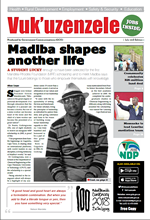July 2018 1st Edition
July 2018 1st Edition vuyelwanTranslations
Nelson Mandela’s new South Africa
Nelson Mandela’s new South Africa lebangMandela Centenary
In commemorating Madiba’s legacy, his role in building a new South Africa must be celebrated alongside his history as a freedom fighter. legacy, his role in building a new South Africa must be celebrated alongside his history as a freedom fighter.
When Nelson Mandela took office as South Africa’s first democratic president in 1994, he had the momentous task of laying the foundations for a New South Africa
One of Mandela’s first actions was the development of a new parliament tasked with making the many legislative changes needed in South Africa.
Also crucial was the introduction of the Reconstruction and Development Programme (RDP), which was adopted in 1994 to rebuild and transform South Africa’s economy and reverse apartheid inequalities. Priority areas of the RDP included housing, provision of water and electricity, land reform, health care and public works programmes.
Between 1994 and 2000, over 1,1 million RDP houses were built. Nearly five million people received access to piped water and over 1,7 million homes were electrified. By the end of 1998, 500 clinics had been built; 250 000 people had received land by 1999; and employment was given a major boost through the Public Works Programme, which employed more than 240 000 people in five years.
A caring leader
Also in 1994, Mandela announced that free public health care would be provided to pregnant women, breastfeeding mothers and children under the age of six. This was the first time any form of free health care had been provided to South Africans. In 2006, Mandela’s legacy was extended to offer primary healthcare services to all users of public facilities.
With children holding a special place in his heart, Mandela introduced the Primary School Feeding Scheme shortly after taking office. Over four million children were reached. Today, the National School Nutrition Programme feeds over eight million learners a day.
In the apartheid era, social benefits favoured the white minority. Mandela’s administration levelled the playing field, and by 1994 all beneficiaries received the same grant levels. Today, the grant system covers the elderly, persons with disability, war veterans and foster children, with 17 million people benefitting.
Peopleís rights protected
In addition to improving economic and living conditions, one of Mandela’s priorities was the protection of citizens’ rights. The South African Human Rights Commission was inaugurated in 1995, and several other important organisations – including the Public Protector, the Gender and Youth Commissions and the Truth and Reconciliation Commission – were also established.
Restrictive apartheid employment conditions – such as the prohibition of strikes – were addressed through 1995’s Labour Relations Act.
So much positive progress in such a short space of time was unprecedented in South Africa. Emerging from the ashes of economic isolation, segregation and inequality, the foundations of the new democratic nation had been well and truly built.
Bicycles make patrolling for CPFs easier
Bicycles make patrolling for CPFs easier LondekileQhubeka is an Nguni word that means to move forward and with a bicycle a person can travel faster and further.
Patrolling the streets to assist the police in fighting crime will be a little easier for the Community Police Forum (CPF) of Alexandra informal settlement and Orlando thanks to a bicycle donation from Qhubeka. 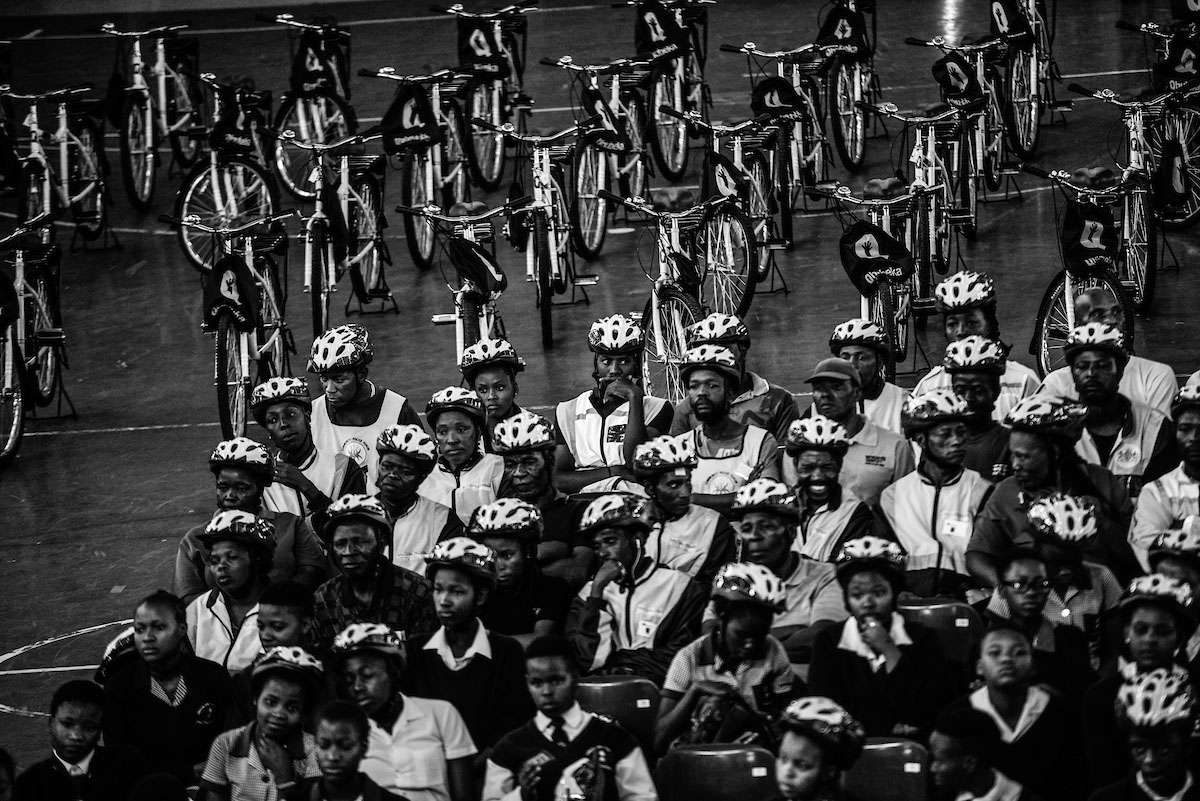
The NGO recently donated 260 bicycles to school children from Realogile High School, and members of the Alexandra and Orlando CPF in Gauteng.
The programme seeks to improve access to schools, clinics and jobs by providing bicycles for communities.
Qhubeka is Nguni word that means “to progress” or “to move forward”. With a bicycle, a person can travel faster and further.
Themba Phanya from the Orlando CPF said thanks to the bicycle donation, they are able to patrol their community and assist the police in the fight against crime.
“We are able to move from one street to the next quicker. Our plan is to work together with the SAPS in fighting crime in our community."
He added that it is initiatives such as this one where civil society, government and the private sector work together to fight crime.
This programme is also a public private partnership between the City of Johannesburg (CoJ), Qhubeka, Volkswagen South Africa and local schools and CPFs.
“Our ongoing partnership with CoJ is part of a far-reaching bicycle programme in the region, which has included constructing bicycle lanes and funding bicycles to help school children and adults with personal transport,” said Qhubeka Executive Director Tsatsi Phaweni.
“These bicycles will help schoolchildren to get to school faster and regularly, while those for the CPF and patrollers will assist with more visible and effective security patrols, boosting the safety for everyone in the community.”
Last year, more than 90 bicycles were distributed to schoolchildren, health workers and CPF community members.
“We’re so pleased that the partnership between the organisations has enabled us to give back to this deserving community,” says Meredith Kelly, Marketing Manager of Volkswagen Group South Africa.
“Through partnerships like this one, we continue to see invaluable examples of how bicycles can help to transform communities. We hope to not only mobilise South African communities, but help ensure a better future for all who live in the country.”
Community celebrates R21-million land deal
Community celebrates R21-million land deal UrsulaA land settlement deal near Alice in the Eastern Cape heralds more black participation in the tourism sector.
An Eastern Cape community is set to walk on the wild side after receiving government funding to facilitate a community-led wildlife management programme.
The community of Double Drift near Grahamstown comprises 1 500 people from 264 families. They were removed from their land by the Ciskei government in 1991 to make way for a white-owned game reserve.
The community recently received the title deeds for the land which was returned in terms of the land redistribution programme.
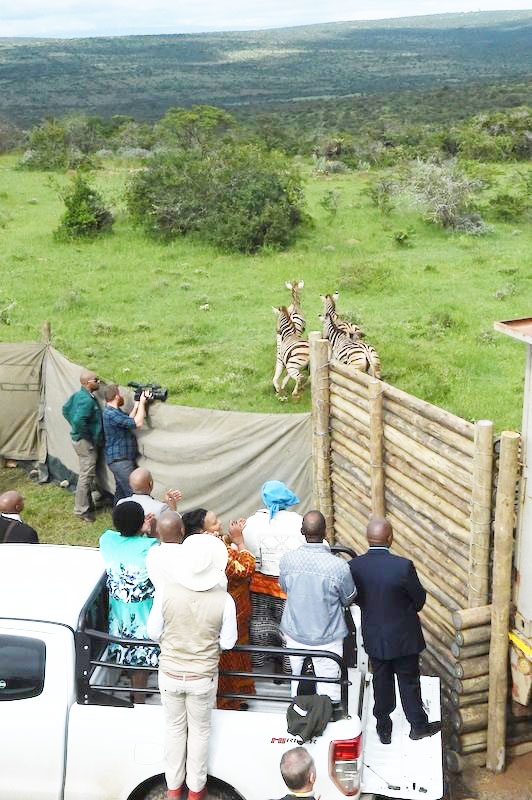
According to Eastern Cape Premier Phumulo Masualle, R21 million has been committed to the land settlement deal and is being handed over in phases.
“This is a significant step in terms of conservation and transformation. The facility is being developed to compete fairly with other game reserves and government is supporting the community through funding, the donation of game and training,” said Masualle.
The community, which co-manages the game reserve with the Eastern Cape Parks and Tourism Agency (ECPTA) under the banner of the Likhayalethu Communal Property Association (LCPA), received R6 million from the Department of Environmental Affairs to develop a wildlife economy venture on the 1 400 hectare game farm that was bought for them through the Department of Rural Development and Land Reform.
LCPA chairperson of the Mxolisi Ngesi, said the community lodged its claim in 1998. In 2012, community members were given 23 500 ha which has since been supplemented by the additional 1 400 ha game reserve.
“We are very excited because we finally got everything we wanted. The government gave us funding for infrastructure. We have game which includes 10 mountain zebra, 15 hartebeest and 10 eland,” said Ngesi adding that buffalo and impala would soon be acquired.
He added that the community was getting training from the ECPTA to run the game re-serve.
“The plan is to build two lodges and currently we are building field ranger bases and a boma to offload the animals,” said Ngesi.
“Through the installation of a 10 km fence and the entrance gate, 61 job opportunities for the community have been created,” said the Minister of Environmental Affairs Edna Molewa during the official handover.
Community involvement in health care produces brilliance
Community involvement in health care produces brilliance UrsulaBatho pele principles and a high regard for patient’s rights is key
The staff at Maphophoma clinic in Nongoma in KwaZulu-Natal are an example of how the community and public servant can work together to create excellence.
Maphophoma Clinic received first place in the Ideal Clinic Realisation and Maintenance category during the KwaZulu-Natal Health MEC Sibongiseni Dhlomo’s Annual Service Excellence Awards held recently.
Primary Healthcare Manager for the Nongoma sub-district Zinto Dube said this would not have been possible if the local clinic did not include community members in its programmes through Operation Sukuma Sakhe.
Operation Sukuma Sakhe is a KwaZulu-Natal Provincial Government’s initiative that is characterised by continuous interaction between government and the community in order to come together and make service delivery more effective.
The clinic receives between 200 and 250 patients on a daily basis. It operates Monday to Sunday from 7am to 4pm. After hours the clinic only receives emergency cases as its staff members are always on call.
Dube said Maphophoma Clinic prioritises clinic committee structures that involve Induna, community leaders and the youth for all programmes. She said the clinic also uses the adolescent and youth friendly strategy to meet the health care needs of young people.
The clinic has a traditional health practitioners structure through which it encourages traditional healers to refer their patients to the clinic so that they can fight diseases together.
“Since we are in the rural areas a lot of people still strongly believe in getting help from traditional healers. We do not stop them from doing that but we ask them to visit clinics to get professional help and the local traditional healers do refer their patients to us,” she said.
“Team effort is also key in making everything work. The clinic does not have enough staff members but because there is a spirit of team work it is winning,” she added.
She said the staff at the clinic uphold Batho Pele principles and are well orientated when it comes to patients’ rights.
In addition the clinic conducts a survey which allows patients to give feedback on service delivery. “We listen to patients and make changes whenever necessary,” said Dube.
She also said it was important for management of any healthcare facility to always listen to grievances of employees and try to offer support before things get out of hand.
What is an Ideal Clinic?
It is a clinic in South Africa that will open on time and will not close until the last patient has been helped – even if it is beyond operating hours. It will ensure patients are treated with dignity.
Corks pop for KZN community winery
Corks pop for KZN community winery UrsulaA KZN community views grapes in a new way thanks to a community winery that is empowering people and creating jobs.
Wine vineyards and the Cape are intertwined but a KwaZulu-Natal (KZN) co-operative winery hopes to break this perception with the introduction of a fine coastal wine made with grapes grown in rural vineyards.
The 12 hectares of vineyards are spread across the Ilembe District Municipality in the rural areas of Mandeni, Ndwedwe and Maphumulo. The project is run by a local Ilembe co-operative and supported by the KZN Department of Cooperative Governance and Traditional Affairs, which has injected R19,5 million into the development of the vineyards and processing facility.
Named Seventeen 87 (the year in which Zulu King Shaka was born), the wine not only pays tribute to one of the province’s most legendary leaders but is a proudly KZN product, with all processes done locally. 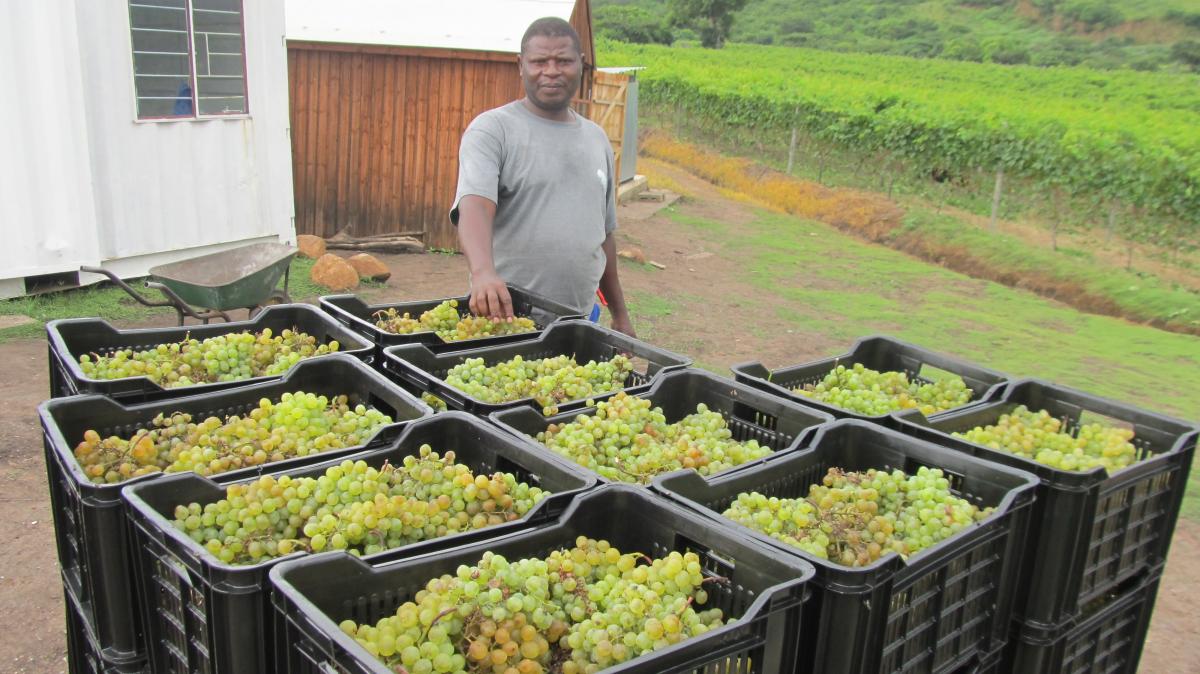
Mandeni Nyoni Ilembe Co-operative supervisor Sipho Gumede is a member of the cooperative and said the business has changed the lives of people in Mandeni.
"We were sitting at home hopeless without jobs but now we are able to take care of our families. To hold this bottle of wine makes me emotional and proud at the same time since this is something l was part of from scratch.”
“l now know how to plant, nurture and spray the crops. l am able to pass this knowledge to someone else. I did know about the varieties of grapes but being here l am able to differentiate them,” said Gumede.
He said what he enjoys most about the project is that he is working with members of his community and they are building a business that belongs to them.
Seventeen 87 was introduced at Africa’s Travel Indaba held in Durban recently.
The vineyards in the Mandeni and Maphumulo local municipalities saw their first harvest in February, with the testing of the winery equipment conducted by a viticulturist in the same month.
In the three months that followed, eight tons of grapes were processed and 8 000 litres of wine produced.
Winemaker Daniel Maerkl who was teaching the cooperative how to cultivate the wine explained that the community owns the project and will be empowered to eventually manage all the winery’s processes on their own.
Creating jobs for KZN youth
Creating jobs for KZN youth lebangThe old saying ‘sink or swim’ is a thing of the past for youngsters enrolled in a free swimming programme.‘sink or swim’ is a thing of the past for youngsters enrolled in a free swimming programme.
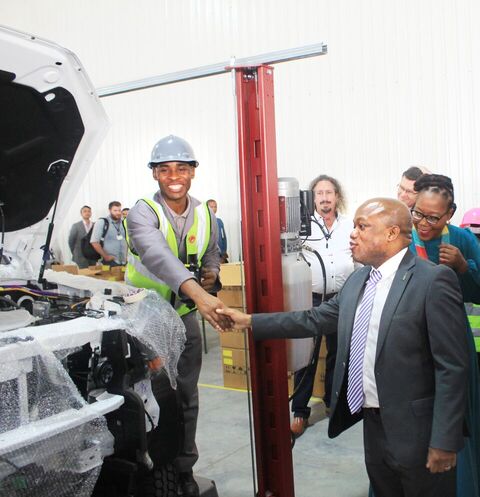 Twenty-five young people from KwaZulu-Natal are set to benefit from a new R95 million Mahindra plant which will manufacture a new range of double cab bakkies called Pik Up on the outskirts of Durban.
Twenty-five young people from KwaZulu-Natal are set to benefit from a new R95 million Mahindra plant which will manufacture a new range of double cab bakkies called Pik Up on the outskirts of Durban.
The staff received training in partnership with global Mahindra and Mahindra group and AIH logistics.They will be sent to India for further training where required.
The trial production of the facility is underway with an estimated 2 000 vehicles planned to be produced annually, eventually leading to 4 000 vehicles rolling off the assembly lines a year.
"The investment is good for business confidence.lt continues to show that KwaZulu-Natal is a conducive place for investors. lt also sends a message to those who remain reluctant that Durban is a place to consider when it comes to investment," said MEC for Economic Development, Toursim and Environmental Affairs Sihle Zikalala.
He said the initial employment opportunities generated in this enterprise would contribute to the expansion of the skills base in the province.
One of the employees is engineering graduate Sthembiso Mthembu who said he is very happy to have a job.
"I have been sitting a home for a year without getting any employment. This opportunity has helped me to provide for myself and family. Although l have a mechanical engineering degree l didn't know much about assembling a car. The training they gave us helped us to gain confidence and expertise," he said.
Mahindra's Chief of International Operations Arvind Matthew said the company aims to source 40 percent of the components for the Pik Up bakkie from local suppliers.
"The assembly of the Pik Up is the first step in our long-term plan that will see us increase employment and local sourcing in KwaZulu-Natal,” he said.
Digital games empowering communities
Digital games empowering communities lebangPlaying games are helping a disadvantaged Western Cape community.
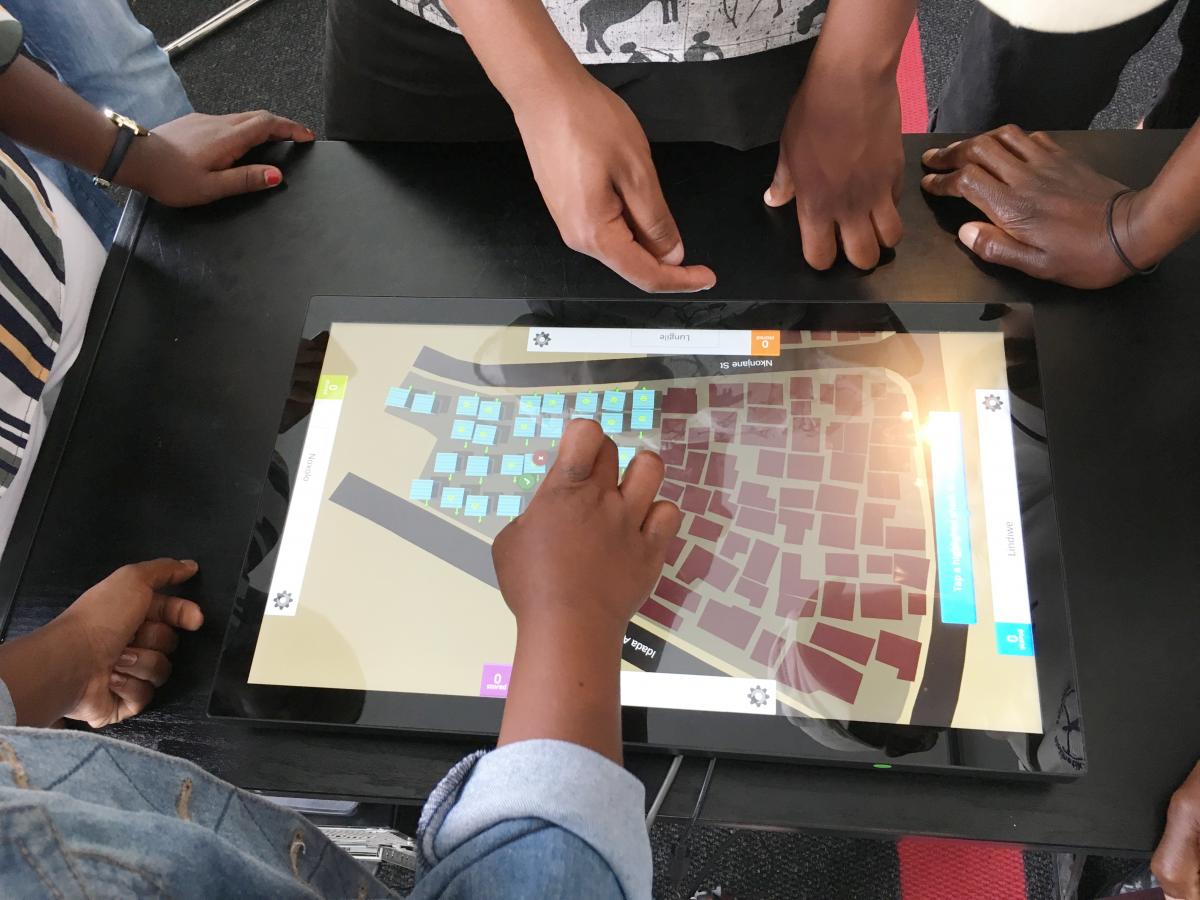 Many people view digital gaming as a hobby or past-time without much educational value but in the Western Cape the use of digital games is emerging as a revolutionary way to improve living conditions in disadvantaged communities.
Many people view digital gaming as a hobby or past-time without much educational value but in the Western Cape the use of digital games is emerging as a revolutionary way to improve living conditions in disadvantaged communities.
Established by the Cape Innovation and Technology Initiative and funded by the Western Cape Department of Economic Development and Tourism (DEDAT), the Serious About Games initiative supports the development of games that encourage learning and social change.
“Games make great tools for learning. But unlike books and television games they are immediately interactive,” said Nicholas Hall, CEO of Interactive Entertainment South Africa, a partner in the project.
In 2016, a competition was lauched, calling for local game developers to create a game that would help address socio-economic challenges in the Western Cape. Out of 16 finalists, the winner was announced as Vukuzenzele, an Android-based game which allows communities to learn about a concept called reblocking.
Reblocking refers to a community-driven process in which settlement layouts are redesigned to allow better access for emergency vehicles and the provision of infrastructure and basic services.
Nokuthula Dlamini from Khayelitsha is one of the community members who found the game educational after playing it said that Vukuzenzele gives communities the power to change their living environment for the better.
“Since I am now aware of how settlement layouts should be I can do it myself all because of the Vukuzenzele game.”
The reblocking concept was developed by non-profit organisation Ikhayalami, which partnered with software development company RenderHeads to develop Vukuzenzele. The game is now being tested in the AT Section of Khayelitsha on the outskirts of Cape Town.
Andy Bolnick, founder and manager of Ikhayalami, said that 28 community members split up into teams of four and played the game.
“Each player in the team chooses two shacks to move and then repositions them so eventually the entire settlement is reconfigured. The level of interest has been amazing. By their own choice, each team spent 30 hours playing the game,” said Bolnick.
From the seven new layouts created, the Vukuzenzele team, in collaboration with DEDAT, chose three which they believed would be most suitable for implementing the reblocking process in real life.
"This really puts the layout of settlements in the hands of the community. They start to understand the limitations and challenges, and they get excited by what their settlements could look like,” said Bolnick.
Fashion extravaganza at this year’s Durban July
Fashion extravaganza at this year’s Durban July vuyelwanSport, Arts & Culture
Africa’s greatest horseracing event is also one of the continent’s greatest fashion showpiece and this year it is poised to be even more amazing.
Thousands of people are expected to descend on Durban for the Vodacom Durban July (VDJ) to take place at Greyville Racecourse on 7 July and they won’t be there only for the horses
The prestigious sporting and tourism event attracts over 50 000 people from across the country and provides fashion designers with a platform to showcase their skills. 
This year’s VDJ Fashion Experience has added a new element to its popular pre-race day fashion shows with the formalisation of a new category that harnesses some of the best designers to have emerged from the Fashion Experience programme since 2005.
VDJ Fashion Experience programme director Tiffany Prior said there are so many designers who have a long-running association with the VDJ that it made sense to introduce a category – called the Timeless Collection – that showcases their excellence.
“Some of them are former winners of the pre-race day competitions, while others have been loyal supporters of the race day fashion competition. What they all have in common is they are amazing designers with deep roots in the VDJ Fashion Experience, thanks to Gold Circle team.
This year’s fashion show will be separated into three categories: Young Designers, Invited Designers and Timeless Collection. Designers from other provinces will participate in the Invited Designers category. Designers who have previously been part of this category include David Tlale, KLûK CGDT, Zama Mathe, Gideon, Colleen Eitzen, Paledi Segapo and Karen Monk.
Timeless Category designers include Brenda Quin, Sibu Msimang, Skye Pengelley, Madelain Clark, Martin Steenkamp, Racine Lyle Meredith Denny and Sadie Bosworth.
Another Durban designer to have touched almost every aspect of the VDJ fashion programme is Sibu Msimang. She was a finalist in the VDJ Young Designer Award as an enthusiastic student, then an Invited Designer and has also regularly served as a judge. She said her design for this year is ready. “Lovers of fashion must come in their numbers to they see style and glamour at its best,” said Msimang.
Free State ECD spurs love of books
Free State ECD spurs love of books UrsulaThe magic of reading is helping to set a community’s pre-schoolers on the road to success.
Encouraging a culture of reading is one of the reasons that Paballo Day Care Centre and Pre-school is the best early childhood development centre (ECD) in the country.
The centre is located in Nyakallong near Odendaalsrus in the Free State.
It was crowned the best ECD centre at the South African ECD Awards hosted by the National Development Agency last year.
The centre has been operational for 22 years and has 82 children ranging from infants to five years of age.
Their ‘Bana Bukeng’ reading programme promotes and facilitates the love of reading and storytelling to develop the children's vocabulary. 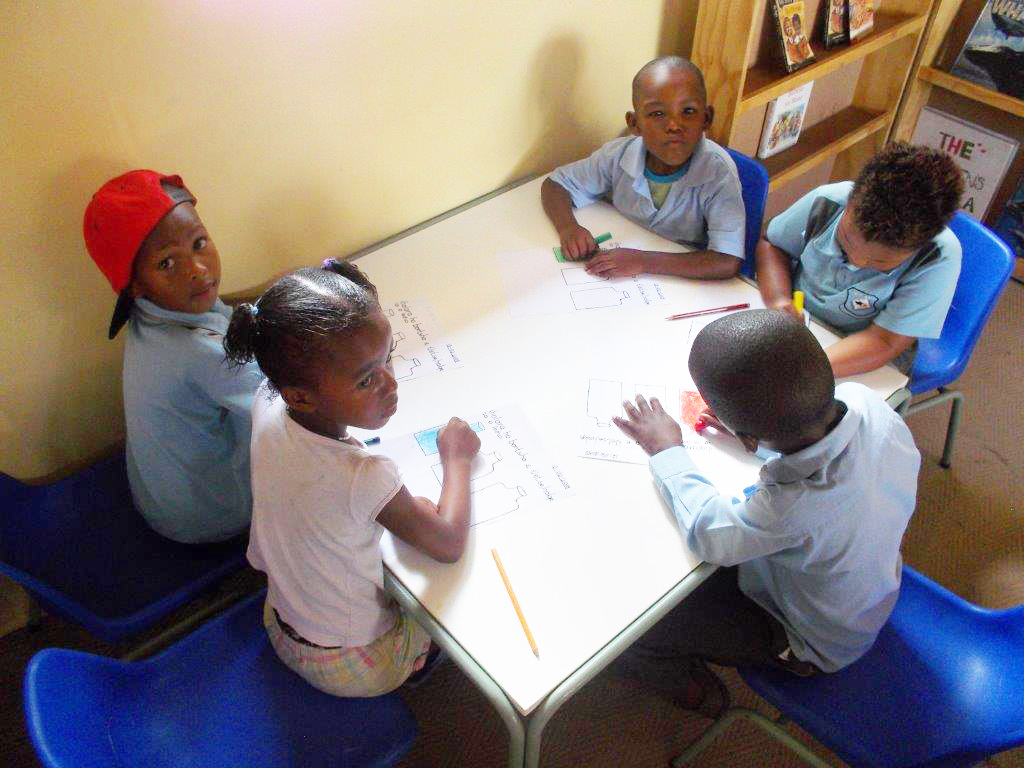
“We usually start with pictures and ask our little ones to tell us what they see. We then introduce words that are aligned with the pictures, followed by constructing a sentence,” said Joyce Mthombeni, who runs Paballo.
She adds this type of learning makes children want to know more about the words in the book.
“On Wednesdays and Fridays, the children get an opportunity to select books that they want to read. This is followed by telling the class what the story they read is about.”
Mthombeni said she has found that children who read at home learn faster, adding that when parents involve themselves in the learning life of a child, they inevitably do better in school.
The centre also runs a successful recycling programme that involves the community. The collected recycled materials are used to make toys for the children with some being sold to the community. The money from sales is used to buy books. Mthombeni encourages parents to send their children to an ECD centre because this helps the child develop quickly and cope better in primary school.
Paballo is registered with the Department of Social Development and receives funding for its work.
During the Minister of Social Development Susan Shabangu’s Budget Vote she said R78,7 million has been allocated to renovate 369 ECD centres.
Free State’s black chemical industrialists create jobs
Free State’s black chemical industrialists create jobs UrsulaThe Black Industrialists Scheme helped Kevali Chemicals buy machinery and equipment to get the business off the ground.
 A local chemical manufacturing company is helping to fight unemployment by creating about 70 sustainable jobs in Harrismith in the Free State.
A local chemical manufacturing company is helping to fight unemployment by creating about 70 sustainable jobs in Harrismith in the Free State.
Kevali Chemicals is the first Free State black owned chemicals manufacturer of a range of water treatment chemicals, hygiene and sanitation solutions as well as adhesives.
The company was founded in 2014 by five friends who have expertise in chemicals, fast-moving consumer goods, product development, and adhesives industries.
Kevali Chemicals Executive Director Funeka Khumalo says the Black Industrialist Scheme supported her company to acquire machinery and equipment to start the manufacturing and production line for water treatment, cleaning and disinfecting as well as adhesives.
“In the beginning we had to inject money to get the business off the ground but ultimately we received funding from the Department of Trade and Industry (the dti) through the Black Industrialists Scheme (BIS) as well as the Industrial Development Corporation (IDC),” she added.
The Black Industrialists Scheme helped Kevali Chemicals acquire machinery and equipment to commence the new manufacturing and production line for water treatment, cleaning and disinfecting as well as adhesives.
The Scheme is a grant programme of the Black Industrialists Policy that aims to unlock the potential within black industrialists within the South African economy through deliberate, targeted and well-defined financial and non-financial interventions.
 Khumalo said it took about R18 million to get the business off the ground and about 11 months to start making a profit.
Khumalo said it took about R18 million to get the business off the ground and about 11 months to start making a profit.
The company distributes its products across South Africa as well as in Uganda, Namibia, and Tanzania.
Khumalo said the impact that the company has on the lives of local residents is bigger than job creation.
“Over and above creating jobs for local residents, we have a social investment programme through which we assist small business set up by women in township and rural areas that specialise in the manufacturing of domestic hygiene and sanitation products,” she said.
She said young entrepreneurs should know that starting a business is never easy but they should not lose heart as they will later enjoy the rewards.
The Deputy Minister of Trade and Industry Bulelani Magwanishe said Kevali has the honour of being the first company specialising in the chemicals, pharmaceuticals and plastics sector to have ever been approved since the establishment of the Black Industrialists Programme in 2016.
“The company will provide much needed job opportunities to the surrounding communities of Harrismith which are gripped by high levels of unemployment,” Deputy Minister Magwanishe said.
Grooming future gymnasts in rural Thaba Nchu
Grooming future gymnasts in rural Thaba Nchu JoyKediemetse Moloeloe wants to put Thaba Nchu in the Free State on the map through her passion for gymnastics as she teaches young children and youth about this sport.
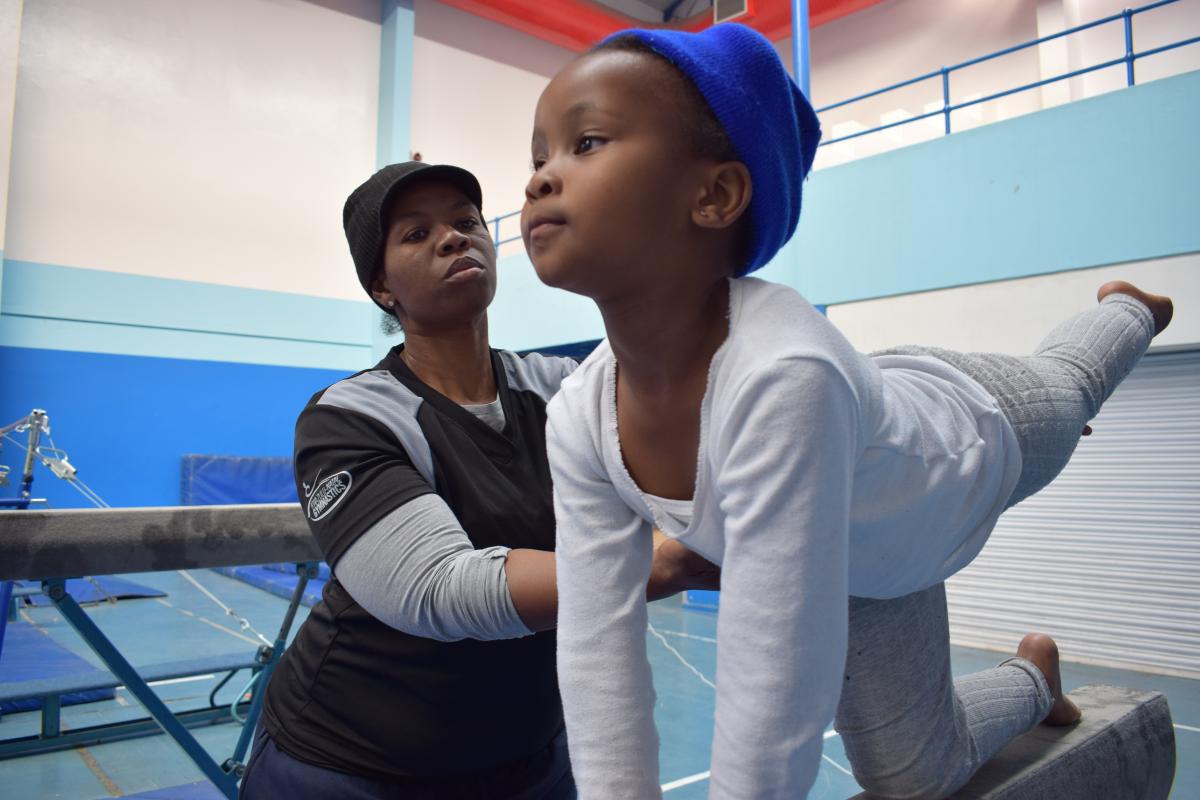 Moloeloe owns the Thaba Nchu Gymnastics Club at Mmabana Cultural Centre in Thaba Nchu which has 50 students.
Moloeloe owns the Thaba Nchu Gymnastics Club at Mmabana Cultural Centre in Thaba Nchu which has 50 students.
“At the moment I train children and youth with the youngest one being six-years-old and the eldest seventeen.”
“Seeing these kids full of joy is my pride and pleasure keeps me doing what I do every day.”
Moloeloe (35) is a retired gymnast who has represented South Africa at the Gymnastrada in 1999 and again in 2007 during the World Gymnatrada in Austria.
She was introduced to gymnastics more than two decades ago and has never looked back.
“Gymnastics taught me a lot about discipline and rising up after failing. This is a very disciplined sport. When you fall down you have no choice but to get up.”
After retiring from competing she decided to pursue a career in statistics and economics especially since she had a qualification in this field but the love for gymnasium kept drawing her back.
She opted to approach the Department of Sports, Arts, Culture and Recreation in Free State to pursue her dream of opening a centre where children and youth can become gymnasts.
Moloeloe added that she also wanted to see young people occupied in something positive especially with all the social ills in her community.
The road to having a gymnastic club was not easy for Moloeloe.
“The first year was extremely difficult having to pay rent for the club that only had one student. We worked hard in marketing our business for the community to know more about it.”
According to Moloeloe the club started gaining momentum two years after it was established and since then it has continued to be a success.
Highlighting some of the club’s achievements Moloeloe points out that one of her student’s achieved a silver medal during the National Gymnast Games last year.
“I want to put Thaba Nchu on the map and let people see that this rural place has talent and that is what has kept me home bound. If I can put one child on an Olympic stage I will be very proud,” said Moloeloe.
Jobs - Labour July 2018
Jobs - Labour July 2018 vuyelwanDeputy Director: Labour: Centre Operations (2 posts)
Labour Centre: Malelane- Reference No: HR4/4/7/40
Labour Centre: Tzaneen- Reference No: HR 4/6/6/02
Salary: All inclusive: R 779 295 per annum
Enquiries: Ms. M Mazibuko, Tel: (013) 655 8701; Ms. TE Maluleke, Tel: (015) 290 1662
Provincial Office
Chief Director: Private Bag X 7263, Emalahleni, 1035
Chief Director: Provincial Operations: P/ Bag X 9368, Polokwane, 0700
SAP Analyst
Chief Directorate: Information Communication Technology
Ref No: HR4/18/07/01HO
Salary: Commencing: R334 545 per annum
Enquiries: Ms. E Cronje, Tel: (012) 309 4876
Head Office
Chief Director: Human Resources Management: Private Bag X 117, Pretoria, 0001
Assistant Director: Operations
Provincial Office: Gauteng stationed at Labour Centre: Germiston
Ref No: HR 4/4/4/06/01
Salary: Commencing: R 417 552 per annum
Enquiries: Mr. BJ Dingaan, Tel: (011) 853 0300
Provincial Office
Chief Director: Provincial Operations: PO Box 4560, Johannesburg, 2001
Assistant Director: Fleet Management Services
Provincial Office: KwaZulu-Natal
Ref No: HR 4/4/5/41
Salary: Commencing: R 334 545 per annum
Enquiries: Mr EM Khambula, Tel: 031 366 2203
Provincial Office
Chief Director: Provincial Operations: PO Box 940, Durban, 4000
Deputy Director: Risk Management
Provincial Office: East London
HR4/4/1/53
Salary: All inclusive: R657 558.00 per annum
Enquiries: Mr WG Dumalisile, Tel: (043) 701 3032/38
Provincial Office
Chief Director: Provincial Operations: Private Bag X 9005, East London 5201
Deputy Director: Human Resource Management
Centre: Sheltered Employment Enterprise, Silverton
Reference No: HR5/18/05/21
Salary: All inclusive: R 779 295 per annum
Enquiries: Ms. BP Thwala, Tel: (012) 843 7300
Head Office
Chief Director: Human Resources Management: Private Bag X 117, Pretoria, 0001
Deputy Director: Human Resource Management
Centre: Sheltered Employment Enterprise, Silverton
Reference No: HR5/18/05/21
Salary: All inclusive: R 779 295 per annum
Enquiries: Ms. BP Thwala, Tel: (012) 843 7300
Head Office
Chief Director: Human Resources Management: Private Bag X 117, Pretoria, 0001
Psychometrist / Registered Counsellor
Grade Grade 1
Labour Centre: Kroonstad
Reference No: HR4/4/8/184
Salary: Commencing: R 514 476 (OSD)
Enquiries: Mr. SH Malope, Tel: 056 215 1812
Provincial Office
Chief Director: Provincial Operations: P O Box 522, Bloemfontein, 9300
Assistant Director: Career Counsellor
Labour Centre: Ermelo
Ref No: HR 4/4/7/39
Salary: Commencing: R417 552 per annum
Enquiries: Ms. L Mashego, Tel: (017) 819 7632
Labour Centre
Deputy Director: Labour Centre Operations, Private Bag x 9054, Ermelo, 2350
Assistant Director: Fraud Investigation and Anti- Corruption
Provincial Office: Western Cape
Ref No: HR 4/4/10/199
Salary: Commencing: R 334 545 per annum
Enquiries: Ms. Z Maimane, Tel: (021) 441 8125
Western Cape
Chief Director: Provincial Operations: PO Box 872, Cape Town, 8000
Disability Manager
(Occupational Therapist)
Provincial Office: Eastern Cape
Ref No: HR 4/4/7/80
Salary will be in accordance with the OSD Determination
Enquiries: Mr WC Mafu, Tel (043) 7027500
Provincial Office
Chief Director: Provincial Operations: Private Bag X9005, East London 5200
Closing date for applications: 16 July 2018 | For full details of the advertised posts visit our website: www.labour.gov.za
Applications must be submitted on form Z83, obtainable from any Public Service Department or on the internet at www.gov.za/documents. The fully completed and signed form Z83 should be accompanied by a recently updated, comprehensive CV as well as recently certified copies of all qualification(s) including a Senior Certificate and ID-document [Driver’s license where applicable]. Non-RSA Citizens/Permanent Resident Permit Holders must attach a copy of their Permanent Residence Permits to their applications. Should you be in possession of a foreign qualification, it must be accompanied by an evaluation certificate from the South African Qualification Authority (SAQA). Applicants who do not comply with the above-mentioned requirements, as well as applications received late, will not be considered. The Department does not accept applications via fax or email. Failure to submit all the requested documents will result in the application not being considered. Correspondence will be limited to short-listed candidates only. If you have not been contacted within eight (8) weeks after the closing date of this advertisement, please accept that your application was unsuccessful. Suitable candidates will be subjected to a personnel suitability check (criminal record, citizenship, credit record checks, qualification verification and employment verification). Where applicable, candidates will be subjected to a skills/knowledge test. All shortlisted candidates for SMS posts will be subjected to a technical competency exercise that intends to test relevant technical elements of the job, the logistics of which be communicated by the Department. Following the interview and technical exercise, the selection panel will recommend candidates to attend generic managerial competencies using the mandated DPSA SMS competency assessment tools. Successful candidates will be appointed on a probation period of 12 months. The Department reserves the right not to make any appointment(s) to the above post. The successful candidate will be expected to sign a performance agreement. The Department of Labour is an equal opportunity affirmative action employer. The employment decision shall be informed by the Employment Equity Plan of the Department. It is the Department’s intention to promote equity (race, gender and disability) through the filling of this post(s) with a candidate whose transfer / promotion / appointment will promote representativity in line with the numerical targets as contained in our Employment Equity Plan.
Jobs: Compensation Fund July 2018
Jobs: Compensation Fund July 2018 vuyelwanThe Department of Labour’s intention to promote equity through the filling of these posts with the candidates whose transfer/appointment will promote representivity in line with the numeric targets as contained in the Employment Equity Plan of the Department.
Assistant Director: Fraud Investigations
Centre: Compensation Fund Pretoria
Reference No: HR 5/1/2/3/86
Remuneration Package: R 334 545 – 394 065 per annum (SR 9)
Enquiries: Mr J Ngapo: (012) 313 6339
Requirements: A Three year qualification in Commerce/ Law.● 2 years functional experience in Investigation on crime or in anti-corruption on Senior Practitioner level. ● 2 years supervisory experience.
Assistant Director: Debt Management
Centre: Compensation Fund, Pretoria
Reference No: HR 5/1/2/3/87
Remuneration package: R 334 545 – 394 065 per annum (SR 9)
Enquiries: Mr M G Molotsi: (012) 319 9226
Requirements: A Three year qualification in Financial Management or Accounting ● 3 years’ supervisory experience in Debt Collection Management environment as an Accountant/ State Accountant level in debt management environment.
Assistant Director: Admin Cost
Centre: Compensation Fund, Pretoria
Reference No: HR 5/1/2/3/88
Remuneration package: R 334 545 – 394 065 per annum (SR 9)
Enquiries: Ms P Sihlangu: (012) 319 9120
Requirements: A Three year qualification in Accounting/ Economics/ Statistics.● 3 years experience in Administration environment on a Senior Practitioner level.
Assistant Director: Private Employer
Centre: Compensation Fund, Pretoria
Reference No: HR 5/1/2/3/89
Remuneration package: R 334 545 – 394 065 per annum (SR 9)
Enquiries: Ms P Sihlangu: (012) 319 9120
Requirements: A Three year qualifications in Nursing Diploma/ Operations Management/ Law or Business Management.● 2 years functional experience in a claims adjudicating and social security/ insurance environment. ● 2 years supervisory experience
Assistant Director: SCSF Programs 2 Posts
Centre: Compensation Fund, Pretoria
Reference No: HR 5/1/2/3/90
Remuneration package: R 334 545 – 394 065 per annum (SR 9)
Enquiries: Ms P Sihlangu: (012) 319 9120
Requirements: A Three year qualification in Public Administration/ Management/ Social Sciences/ Project Management/ Auditing.● 2 years functional experience in Project Management/ Labour Relations Services. ● 2 years supervisory experience
Assistant Director: Billing and Clinical Coding
Centre: Compensation Fund, Pretoria
Reference No: HR 5/1/2/3/91
Remuneration package: R 334 545 – 394 065 per annum (SR 9)
Enquiries: Ms D Nkabinde: (012) 319 9378
Requirements: A Three/ Four yearqualification in Nursing/ Occupational therapy/ Physiotherapy.● Certificate in billing and clinical coding. ● 2 years functional experience in billing and clinical coding environment. ● 2 years supervisory experience. ● Registration with South African Nursing Council/ HPCSA.
Assistant Director: COID Statutory Services 4 Posts
Centre: Compensation Fund, Pretoria
Reference No: HR 5/1/2/3/92
Remuneration package: R 334 545 – 394 065 per annum (SR 9)
Enquiries: Mr B Ngcobo: (012) 319 9378
Requirements: BCom Degree in Law/LLB ●Admission as an Attorney or Advocate will be added an advantage. ●2 years functional experience in legal or statutory services environment. ●2 years supervisory experience. ●A Valid drivers licence.
Assistant Director: Employer Compliance 2 Posts
Centre: Compensation Fund, Pretoria
Reference No: HR5/1/2/3/93
Remuneration package: R 334 545– 394 065 per annum (SR9)
Enquiries: Mr B Ngcobo: (012) 319 9378
Requirements: A Three year qualification in Auditing/ Financial Management/ Compliance Management. ●2 years functional experience on Senior Admin Officer in Employers audit environment.● 2 years supervisory experience. ● A Valid drivers licence.
Assistant Director: Medical Payments
Centre: Compensation Fund, Pretoria
Reference No: HR 5/1/2/3/94
Remuneration package: R 334 545– 394 065 per annum (SR 9)
Enquiries: Ms D Nkabinde: (012) 319 9378
Requirements: A Three year qualification in Public Administration/ Internal Audit.●2 years functional experience in relevant industry. ●2 years supervisory experience.
Chief Orthotics and Prosthetics 2 Posts
Centre: Compensation Fund, Pretoria
Reference No: HR 5/1/2/3/95
Remuneration package: R 414 069 per annum (OSD) Grade 1
Enquiries: Dr MP Selepe:(012) 319 9495
Requirements: A Three year qualification in Medical Orthotic and Prosthetics ● 3 years experience in orthotics and prosthetics● Registration with the HPCSA ● Post incumbent may be required to travel.
Assistant Director: Occupational Therapy
Centre: Compensation Fund, Pretoria
Reference No: HR 5/1/2/3/96
Remuneration package: R 459 558 per annum (OSD) Grade 1
Enquiries: Dr MP Selepe: (012) 319 9495
Requirements: A National Diploma/ Degree in Occupational Therapy ● Post Graduate Diploma in Vocational Rehabilitation will be added as an advantage ● A Minimum five (5) years experience in Rehabilitation post community service ● Registration with the HPCSA.
Assistant Director: Orthotics and Prosthetics
Centre: Compensation Fund, Pretoria
Reference No: HR 5/1/2/3/97
Remuneration package: R 459 558 per annum (OSD) Grade 1
Enquiries: Dr MP Selepe: (012) 319 9495
Requirements: A Three year qualification in Medical Orthotic and Prosthetics ● 5 years experience in orthotics and prosthetics● Registration with the HPCSA ● Post incumbent may be required to travel.
Assistant Director: Social Services
Centre: Compensation Fund, Pretoria
Reference No: HR 5/1/2/3/98
Remuneration package: R 459 558 per annum (OSD) Grade 1
Enquiries: Dr MP Selepe: (012) 319 9495
Requirements: A Four year qualification/ Degree in Social Work ● A Minimum five (5) years experience in Social Rehabilitation post community service ● Registration with the HPCSA.
Deputy Director: Billing and Clinical Coding
Centre: Compensation Fund, Pretoria
Reference No: HR 5/1/2/3/99
Remuneration package: R657 558 – 774 576 per annum (All inclusive)
Enquiries: Ms D Nkabinde: (012) 319 9378
Requirements: A Three/ Four years qualification in Nursing/ Occupational therapy/ Physiotherapy.● Certificate in billing and clinical coding. ● 3 years functional experience on medical aid/ claims processing environment. 2 years supervisory experience on billing and coding. Registration with South African Nursing council (HPCSA).
Deputy Director: Fraud Prevention and Integrity Management
Centre: Compensation Fund, Pretoria
Reference No: HR 5/1/2/3/100
Remuneration package: R657 558 – 774 576 per annum (All inclusive)
Enquiries: Ms K Lebepe: (012) 406 5626
Requirements: A Three year qualification in Forensic Audit/ Forensic Accounting/ Commerce/ Risk Management.● 3 years functional experience in fraud management. ● 2 years supervisory experience. ● Association of Certified Fraud Examiners (ACFE).
Deputy Director: Employer Compliance
Centre: Compensation Fund, Pretoria
Reference No: HR 5/1/2/3/101
Remuneration package: R657 558 – 774 576 per annum (All inclusive)
Enquiries: Mr B Ngcobo: (012) 319 9378
Requirements: A Three year qualification in Auditing/ Financial Management /Compliance Management.● 3 years functional experience on Assistant Director or entry management level in Employers compliance environment.● 2 years supervisory experience.● A Valid drivers licence.
Deputy Director: COID Statutory Services
Centre: Compensation Fund, Pretoria
Reference No: HR 5/1/2/3/102
Remuneration package: R657 558– 774 576 per annum (All inclusive)
Enquiries: Mr B Ngcobo: (012) 319 9378
Requirements: BCom Degree in Law/ LLB. ● Admission as an Attorney or Advocate will be an added advantage. ●3 years functional experience in a legal services or statutory environment. ●2 years supervisory experience. ●A Valid drivers licence.
Deputy Director: IT Implementation
Centre: Compensation Fund, Pretoria
Reference No: HR 5/1/2/3/103
Remuneration package: R657 558 – 774 576 per annum (All inclusive)
Enquiries: Mr JRT Headbush: (012) 406 5606
Requirements: A Three year qualification in Information and Communication Technology/ Computer Science. ● 2 years functional experience on Information and Communication Technology/ Computer Science environment. ● 3 years supervisory experience in ICT/ Computer Science.
Deputy Director: Medical Payments
Centre: Compensation Fund, Pretoria
Reference No: HR 5/1/2/3/104
Remuneration package: R657 558– 774 576 per annum (All inclusive)
Enquiries: Ms D Nkabinde: (012) 319 9378
Requirements: A Three year qualification in Public Administration/ Internal Audit. ●3 years functional experience in relevant industry. ● 2 years supervisory experience.
Deputy Director: Orthotics and Prosthetics
Centre: Compensation Fund, Pretoria
Reference No: HR 5/1/2/3/105
Remuneration package: R 769 026 per annum (OSD) Grade 1
Enquiries: Dr MP Selepe: (012) 319 9495
Requirements: A Three year qualification in Medical Orthotic and Prosthetics ● 8 years experience in Medical Orthotics and Prosthetics environment ● Registration with the HPCSA ● Post incumbent may be required to travel.
Disability Manager: Occupational Therapy
Centre: Compensation Fund, Pretoria
Reference No: HR 5/1/2/3/106
Remuneration package: R769 026 per annum (OSD) Grade 1
Enquiries: Dr MP Selepe: (012) 319 9495
Requirements: A National Diploma/ Degree in Occupational Therapy ● Post Graduate Diploma in Vocational Rehabilitation will be added as an advantage ● Minimum eight (8) years experience in Rehabilitation post community service ● Registration with the HPCSA.
Director: Customer Care
Centre: Compensation Fund, Pretoria
Reference No: HR 5/1/2/3/107
Remuneration package: R948 174- 1 116 918 per annum (All Inclusive)
Enquiries: Mr V Mafata Tel: (012) 319 9495
Requirements: A Four year qualification at NQF Level 7 (as recognised by SAQA) in Communication or Customer Care or Public Management or Public Administration or Commerce Degree. ● Minimum of 5 years working experience in Customer Care or related industry at MMS level.
Interested persons meeting the requirements are requested to submit a fully completed and signed Z83 form, accompanied by a recently updated, comprehensive CV as well as recently certified copies of all qualification(s) including a Senior Certificate and ID-document [Driving license where applicable] to: The Chief Director: Corporate Services: P O Box 955, Pretoria, 0001 or hand deliver at 167 Thabo Sehume & Madiba Street, Delta Heights Building. Attention: Sub-directorate: Human Resources Planning, Practices and Administration, Compensation Fund on or before 13 July 2018 at 16:00
Suitable candidates will be subjected to a personnel suitability check. Where applicable, candidates will be subjected to a skills/knowledge assessment.
For more details on each post, please be referred to the website: www.labour.gov.za Correspondence will be limited to short-listed candidates only. If you have not been contacted within eight (8) weeks after the closing date of this advertisement, please accept that your application was unsuccessful.
Let’s make Mandela proud
Let’s make Mandela proud LondekileFrom the Union Buildings

There’s an old African proverb that says “If you want to go fast, go alone but if you want to go far, go together.
As South Africans we need to go far together by growing our economy and creating jobs. One of the best ways to do this is by attracting investment into our country.
Investment will not only help build a solid economy but it will also help reduce poverty, boost the number of skilled citizens and make a dent in the unemployment numbers.
In February I announced that encouraging significant new investment in our economy is a top priority for government this year as investment has declined in recent years. Total fixed investment in our economy stood at 24 percent in the GDP of 2008 but it declined to around 19 percent in 2017.
We need to work hard to change this in order for us to realise the goals set in our National Development Plan. In line with this I have launched a new investment drive that will culminate in an Investment Conference to be held in August or September 2018.![[Photo] Nelson Mandela Foundation](/sites/default/files/images_2018_07_01/Nelson%20Mandela_pg3.jpg)
The Conference will involve domestic and international investors in equal measure but it is not intended merely as a forum to discuss the investment climate.
We expect the Conference to report on actual investment deals that have been concluded and to provide a platform for would-be businessmen and women to seek out opportunities in the South African market.
We are determined that the Conference produce results that can be quantified and quickly realised and hope to generate at least US$ 100 billion in new investments over the next five years.
In order to achieve this I have appointed four special envoys to spearhead the investment drive. These are: Mr Trevor Manuel, former Minister of Finance, Mr Mcebisi Jonas, former Deputy Minister of Finance, Ms Phumzile Langeni, Executive Chairperson of Afropulse Group and a non-executive director of several leading South African companies and Mr Jacko Maree, Chairman of Liberty Group and former CEO of Standard Bank.
These special envoys will travel across the globe to market South Africa as a destination of choice for investment, and driving the message that the country is open for business.
I’ve likened these envoys to a pack of lions because they will be hunting down investment for us. We all know that lions run faster when they are hungry.
This is South Africa’s A-team and they will be travelling separately to major financial centres in Asia, Middle East, Europe and the Americas as well as other parts of Africa to meet with potential investors. This will help drive investments across the continent and develop economic trade in the Southern African region and beyond.
As the special envoys travel to different countries they will be communicating a message of a new dawn where investment is a key catalyst.
Our fundamental strengths include our thriving democracy, an independent judiciary and strong institutions. We have an advanced and diverse economy, a sophisticated and well-regulated financial sector as well as extensive transport, telecommunications and energy infrastructure.
Furthermore, we also have a bolstering youthful population, an improving basic education system and significantly expanded higher education enrolment.
At the same time, work is underway to rationalise and streamline investment regulations and reduce the cost of establishing and running businesses.
Through the more effective use of industrial incentives, special economic zones and local procurement requirements, we aim to increase investment in manufacturing and related sectors.
After several difficult years, South Africa is emerging as an increasingly attractive destination for investment.
South Africa has entered a new era of hope and confidence.![[Photo] Nelson Mandela Foundation](https://www.vukuzenzele.gov.za/sites/default/files/images_2018_07_01/Nelson_p3.jpg)
I recently took part in the Common Wealth Heads of Government Meeting (CHOGM 2018) in the United Kingdom. I used this platform to promote trade, investment and the exchange of skills and knowledge between countries.
I also invited investors from the Common Wealth countries to take part in the Investment Conference taking place later in the year.
The Commonwealth is a diverse community of 53 nations that work together to promote prosperity, democracy and peace.
South Africa returned to the Commonwealth in 1994 and has worked together with its fellow members to promote the value, relevance and effectiveness of the association.
We have encouraged businesses in our country to reach out to their Commonwealth counterparts across the globe to forge closer ties and create avenues for greater trade and investment.
The time has come for us to create a new era of investment, job creation and meaningful economic transformation.
Madiba shapes another life
Madiba shapes another life LondekileA student lucky enough to have been selected for the first Mandela-Rhodes Foundation (MRF) scholarship and to meet Madiba says that the future belongs to those who empower themselves with knowledge.
Dr Buntu Godongwana (35), one of eight students to receive an inaugural MRF scholarship in 2005, is proof of this.
“Our progression from humble beginnings in Guguletu, Cape Town, to sharing ideas on international platforms, with world leaders in our discipline, is living testimony of Madiba’s words,” he said.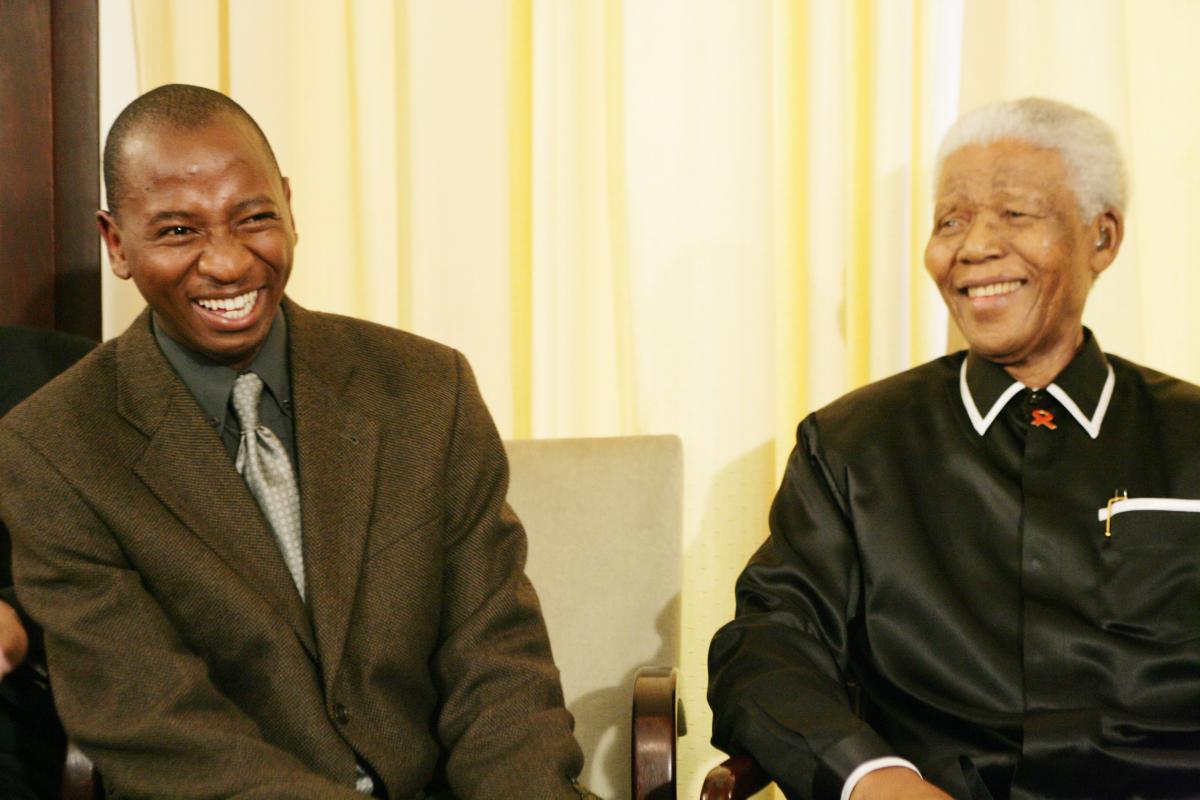
Dr Godongwana, now a lecturer at the Department of Chemical Engineering at the Cape Peninsula University of Technology (CPUT), said the scholarship is a special award.
“Being selected in the inaugural cohort will always be a highlight of my academic career. It’s more than a monetary award, it served as affirmation of our values and recognition of our leadership potential.
“It came with the responsibility of setting the tone and benchmark for future scholars; living the principles of leadership, as embodied by patron Mandela; and giving substance and form to his vision of building exceptional leadership capacity in Africa. I was truly humbled and honoured to be a part of this great vision.”
Born in Guguletu in 1983, Dr Godongwana matriculated from Fezeka Senior Secondary School as the best academic achiever in 2000. He completed his undergraduate studies in Chemical Engineering in 2004 and, along with being awarded the scholarship, was named the Learning Cape Festival Icon by the Western Cape Government in 2005. He completed his Masters degree cum laude at CPUT in 2007 and registered for a PhD degree in Chemical Engineering in 2008.
But his success didn’t stop there. During his doctoral studies, Dr Godongwana was awarded a Fulbright scholarship, as a visiting researcher for 12 months, to Montana State University in the United States.
A bright future
The MRF scholarship certainly set the tone for Dr Godongwana’s bright future.
“The leadership training offered by the foundation instilled in us a sense of service and duty and a commitment to ethical leadership.
“Our association with Madiba’s name has been valuable in expanding our personal and professional networks, being invited to participate on various platforms and given us the opportunity to inspire young people to become agents of change in their communities,” he said.
Dr Godongwana had a beaming smile on his face when he met Mandela at the MRF launch at the University of Cape Town.
“It was a brief encounter. I cannot remember his exact words, but I nodded approvingly at each word from the great man. Madiba’s presence overwhelmed the entire hall,” he said.
This Mandela Month Dr Godongwana urges South Africans to embrace the spirit of Madiba and live up to his standards.”
Men unite to end violence against women and children
Men unite to end violence against women and children vuyelwanAs part of the centenary celebrations of former President Nelson Mandela and struggle stalwart Mama Albertina Sisulu, government and various social partners will on 10 July 2018 host a national #100MenMarch to stop violence against women and children.
Both these stalwarts committed their lives to the fight for human rights particularly women and children. The march in part celebrates their lives but also seeks to raise awareness on the scourge of violence against women and children.
Various formations will in the spirit of #ThumaMina heed the call by President Cyril Ramaphosa that all citizens should take a stand to stop violence against women and children.
The march will draw at least 100 men from various sectors of society, such as government, business, labour, faith-based organisations, non-profit and media organisations to stop the abuse of women and children.
“Government calls on all men to join the #100MenMarch and boldly declare that violence against women and children will not be tolerated in their respective environment or communities. The #100MenMarch will be a motivating force to ensure that men break the chain of abuse,” said Acting Director-General of Government Communication and Information System Phumla Williams.
In support of the #100MenMarch the National Institute Community Development Management (NICDAM) also called on all organisations to demonstrate their support to ending violence against women and children by joining this important cause.
“The scourge of violence against women and children is a huge threat to our development as a nation. On average, one in five South African women older than 18 has experienced physical violence,” the NICDAM said in a statement.
NICDAM is a registered non-profit organisation offering tailored training programmes and evidence-based interventions in the fields of health, social development and education.
The proceedings of the march will commence at Church Square at 10h00 and end on the southern lawns of the Union Buildings by 13h00. Details on road closures will be provided by the City of Tshwane and will be placed on government platforms; www.gov.za @SAgovnews @GovermentZA @VukuzenzeleNews
Members of the public can join in the conversation on Twitter using the hashtag #ThumaMina #100MenMarch.
Minimum Wage seeks to bridge the gap
Minimum Wage seeks to bridge the gap UrsulaThe N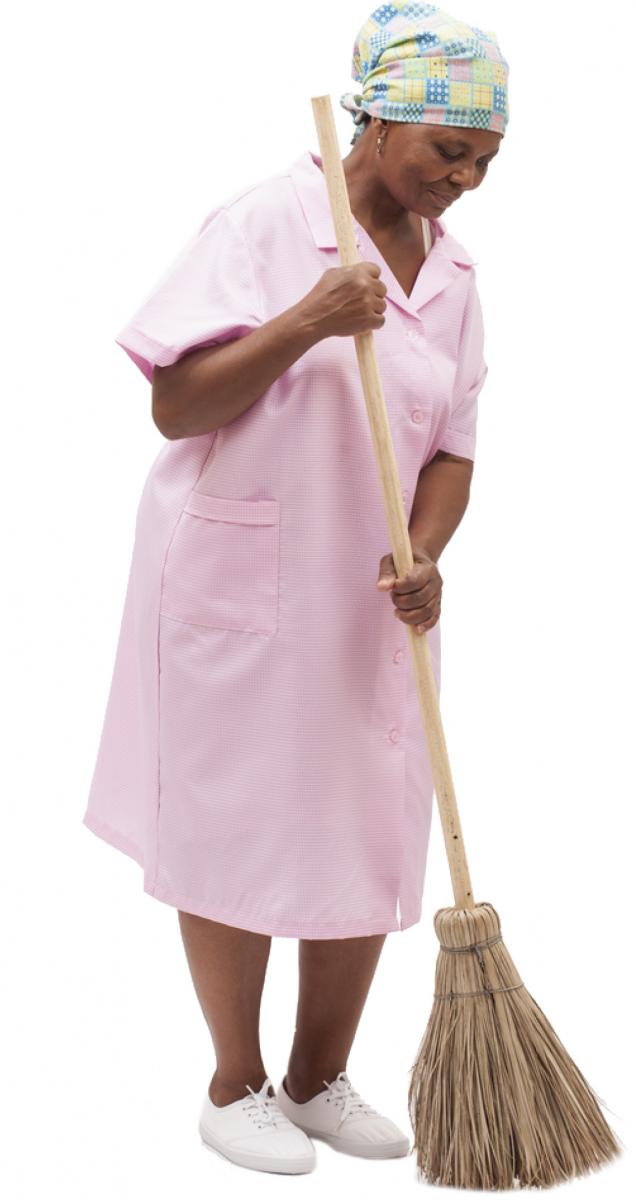 ational Minimum Wage Bill was passed by the National Assembly at the end of May, in a bid to tackle wage inequality in South Africa.
ational Minimum Wage Bill was passed by the National Assembly at the end of May, in a bid to tackle wage inequality in South Africa.
Once approved by the National Council of Provinces (NCOPs), the Bill will be signed into law by President Cyril Ramaphosa.
He has called the Bill a foundation on which the fight for a living wage would be built. The minimum wage is set at R20 per hour in the main industries while the minimum rate for farm workers is R18 per hour and domestic workers R15 or more an hour.
Minister of Labour Mildred Oliphant, who described the Bill as ‘ground-breaking’, also presented two other amended labour bills to the National Assembly – the Basic Conditions of Employment Amendment Bill and the Labour Relations Amendment Bill – both of which were also passed.
Minimum wage gets a thumb up
*Dorris Khambule a domestic worker in Carletonville in Johannesburg expressed that she is thankful for the minimum wage and trusts that it will change the plight of her family.
“Once passed into law, I’ll definitely be in a better position to look after my family and put on food on the table.”
Khambule said she hopes that the minimum wage will also improve the dynamics for domestic workers throughout South Africa who are overworked.
“I must say that I am pleased that Government decided to look into ways to pay us better. taken seriously,” This shows that our trade is being taken seriously said Khambule.

The evolving minimum wage
South Africa has seen the minimum wage evolved over the years in a quest to bridge the gap between the rich and poor while also giving workers’ rights to basic wages.
- 2001- The South African minimum wages were set at R800 for those workers in areas of the country where average household income is more than R24 000 per year and at R650 for those where average household income is less than R24 000 per year.
- 2003 - The a new minimum wages for farm workers were revised and stood at R1 041 per month. In urban areas the minimum wage was R1 041 but rural areas the minimum wage was R989.
- 2009 –The minimum wage for farm workers stood at R6,31 or R1 231 monthly.
- 2010 – The minimum wage for farm workers increased R674 or R1 316 monthly.
- 2014 – Minimum wages for domestic workers in major
* Dorris Khambule is not her real name she chooses to remain anonymous due to fear of being victimised by her employer.
Moseneke to lead Lesotho mediation team
Moseneke to lead Lesotho mediation team vuyelwanInternational Relations / Africa News
In 2014 President Ramaphosa was appointed by the SADC Heads of State and Government as a facilitator in Lesotho.
Former South African Deputy Chief Justice Dikgang Moseneke is set to lead the mediation team of the Southern African Development Community (SADC) Facilitation in the Kingdom of Lesotho.
Moseneke’s appointment by President Cyril Ramaphosa will assist the President as he continues to facilitate the political national dialogue and reform processes in Lesotho. 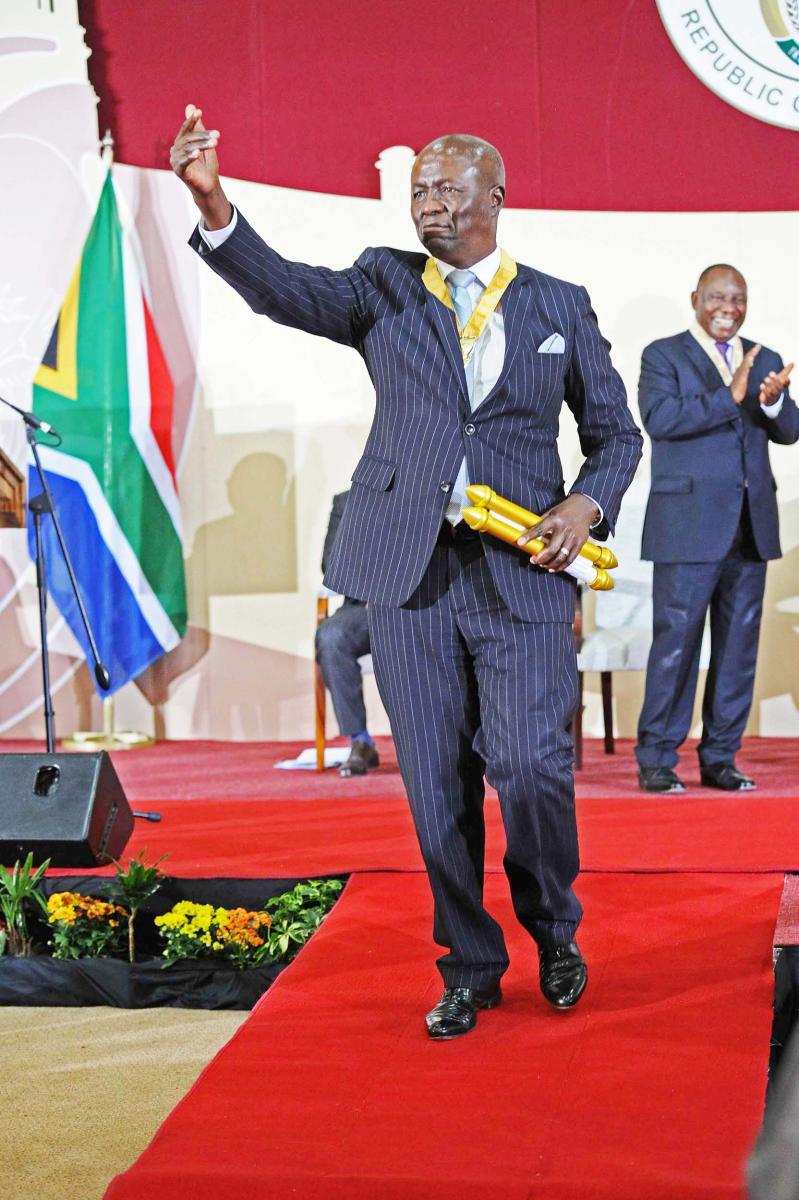
“I take this opportunity to thank Justice Moseneke for availing himself to support us in this important mandate as we continue to assist our brothers and sisters in the Kingdom of Lesotho in their search for a lasting and sustainable solution to their political and security challenges,” said President Ramaphosa.
The decision is in line with the resolution taken at the SADC Double Troika Summit -- held on 24 April 2018 in Luanda, Angola -- where it was decided that President Ramaphosa should continue with the facilitation and recommended that he appoint high level personalities to support him.
In this regard, President Ramaphosa appointed Justice Moseneke as the leader of the mediation team. The team consists of three Deputy Ministers, namely Mohamed Enver Surty of Basic Education, Makgabo Regina Mhaule of International Relations and Cooperation and Ellen Molekane of State Security.
In September 2014, President Ramaphosa was himself appointed by the SADC Heads of State and Government as a SADC facilitator in Lesotho, following the country’s security and political challenges.
The outcomes was a report with key recommendations on constitutional, security sector, judiciary, and public service and media reform issues, which the government of Lesotho committed to undertake to resolve their political and security challenges.
The report was endorsed by SADC and Lesotho was then urged to develop a roadmap on the required reforms, which it has completed.
The Luanda Double Troika Summit endorsed the Lesotho Roadmap for reforms and urged the government of Lesotho to prioritise the constitutional and security sector reforms, which should be delivered by May 2019.
Nelson Mandela timeline of achievements
Nelson Mandela timeline of achievements lebang11 February 1990 – Nelson Mandela is released from Victor Verster Prison after 27 years of imprisonment.
1991 – He is elected president of the African National Congress (ANC).
21 December 1991 – The first plenary session of the Convention for a Democratic South Africa (Codessa) is held at the World Trade Centre in Johannesburg.
10 December 1993 - Mandela and de Klerk jointly win the Nobel Peace Prize for their efforts to end apartheid peacefully.
27 April 1994 – The first democratic elections are held in South Africa.
10 May 1994 – Mandela is inaugurated as the first black democratically elected president of South Africa.
24 May 1994 –Mandela introduces the Reconstruction and Development Programme (RDP) to address socio-economic issues such as jobs, land, housing, water, electricity, telecommunications and transport and resolve and alleviate poverty.
8 May 1995 - Mandela launches the Nelson Mandela Children’s Fund, a charitable organization which aims to help young people, particularly orphans of the AIDS crisis.
19 July 1995 - Mandela signs a bill into law creating the Truth and Reconciliation Commission (TRC) to uncover human rights abuses during the apartheid era.
10 December 1996 - Mandela signs into law the Constitution of the Republic of South Africa, one of the most progressive constitutions in the world. It established a strong central government based on majority rule, and guaranteeing both the rights of minorities and the freedom of expression.
June 1996 - the Growth, Employment and Redistribution (GEAR) macroeconomic policy was introduced to replace RDP. The policy proposed a set of medium-term policies aimed at the rapid liberalisation of the South African economy.
June 1999 - Mandela steps down after one term as President and retires from active politics.
September 1999– The Nelson Mandela Foundation is founded to promote Mandela's vision of freedom and equality for all. Post presidency, Mandela raised money to build schools and clinics in South Africa’s rural areas; advocated for peace and equality; and remained committed in his fight against AIDS.
New bee saving buzz
New bee saving buzz UrsulaWestern Cape environmentalists swarm to the rescue of the humble honeybee.
Like water, land and air, the honeybee is vital to agriculture. 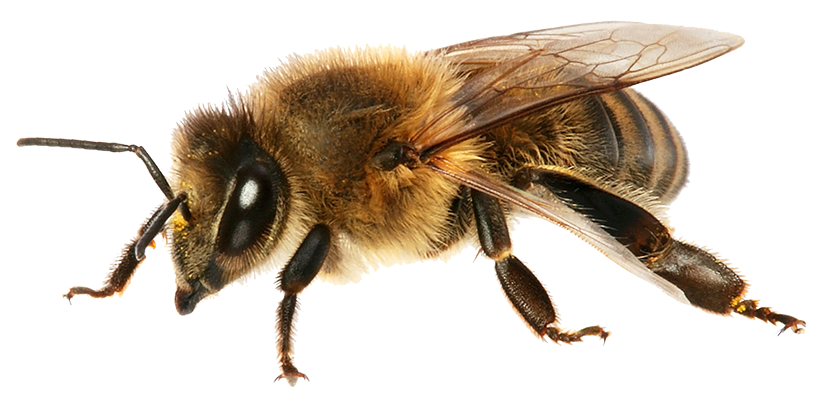
According to the South African National Biodiversity Institute more than 50 different crops in South Africa are reliant on the insect for pollination.
This is why the Western Cape Department of Agriculture and the Western Cape Bee Industry Association have developed a new strategy aimed at ensuring the sustainability of the bee population in the province.
The strategy comes after the bee industry identified several problems affecting bees. These include insufficient food, theft and vandalism, disease, environmental hazards such as pollution, and exposure to external factors such as fires and drought.
 According to the Department of Agriculture, the single largest concern is that there will not be enough food for bees in the Western Cape. South Africa’s honeybee species rely on both indigenous and exotic species like eucalyptus, flowering crops and suburban plants to provide year-round food sources.
According to the Department of Agriculture, the single largest concern is that there will not be enough food for bees in the Western Cape. South Africa’s honeybee species rely on both indigenous and exotic species like eucalyptus, flowering crops and suburban plants to provide year-round food sources.
However, as an alien invasive plant, six species of eucalyptus have been targeted for removal explains the provincial Department of Agriculture.
The strategy proposes that a Bee Forage Commission be established, which will be composed of players from various provincial and national government departments as well as universities and representatives from the bee industry.
Among the projects this commission will undertake are the development of a book exploring bee-friendly plants a campaign with nurseries to mark plants as ‘bee friendly’ in much the same way some species are being marketed as ‘water friendly’ and exploring the possibilities of a mass bee food planting project.
The Western Cape MEC for Economic Opportunities Alan Winde said the report shows that South Africa has imported 2 000 tonnes of honey annually since 2010. "This is an agri-processing opportunity to produce local honey and honey-related products, right here in the Western Cape,” he said.
The chairman of the Western Cape Bee Industry Association, Dr Tlou Masehela, said the industry at large must pull together and make the initiative work.
New sport facilities to improve learner’s health
New sport facilities to improve learner’s health vuyelwanSport, Arts & Culture
A West Rand school principal is happy that his learners have been given a sporting chance to develop their athletic abilities.
Having recreation and sport facilities at schools not only contribute to the overall wellbeing of learners but also nurtures their talents outside the classroom.
This is what Thaga Mankgaba, the principal of Setlolamathe Primary School in Kagiso in the West Rand, had to say after the launch of sport facilities at his school recently.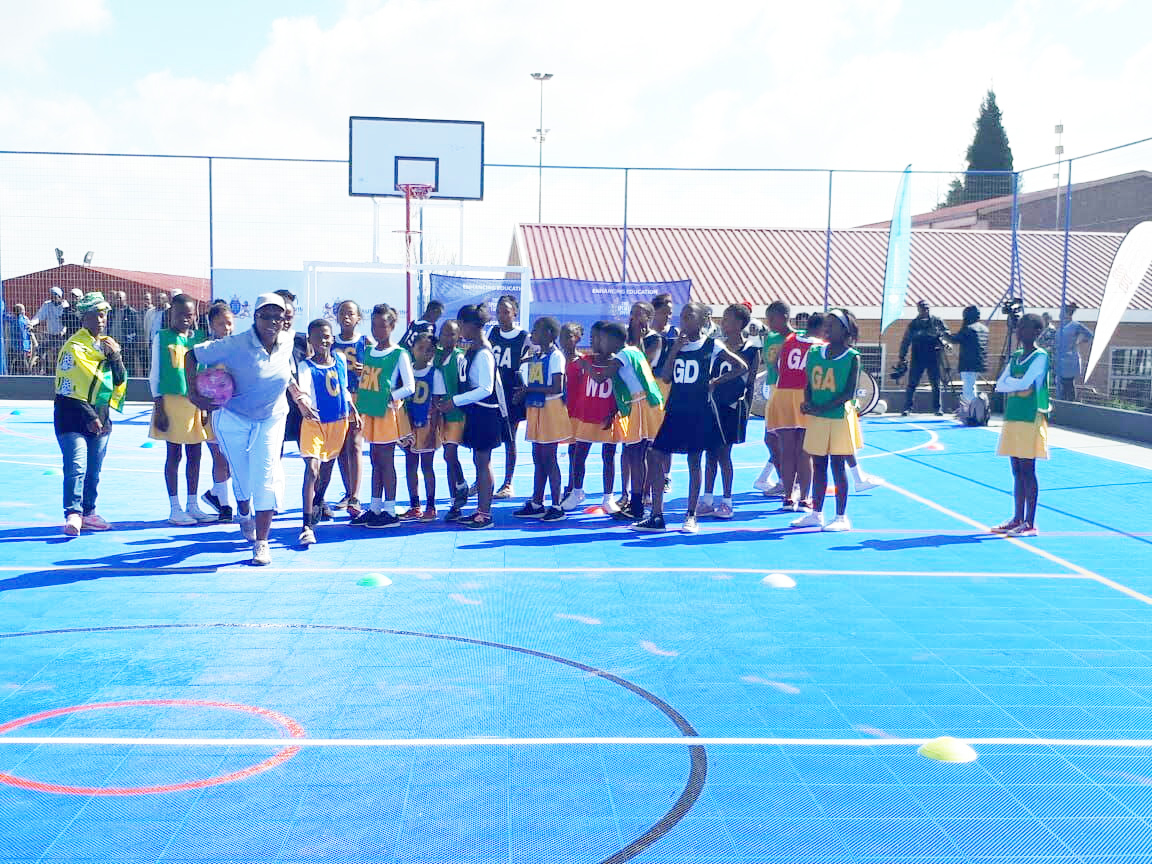
Setlolamathe is one of the two primary schools in the West Rand that had new recreation and sport facilities built on their premises through a partnership between the Gauteng Department of Sport, Arts, Culture and Recreation; Rand West City; Mogale City and Sports Trust.
The facilities boast soccer fields and netball, basketball and tennis courts, among others.
“Some of our learners are not gifted academically but they are passionate about sport. These facilities will help enhance their performance,” he said.
Mankgaba added that the facilities will not only benefit the school but the community of Kagiso as a whole.
“Although priority will be given to our learners, community members can also benefit from these facilities if granted permission by the school governing body to play games on weekends,” he said.
“We plead with community members to help the school safeguard these facilities and everything in our school because this is important for the future of our learners and generations to come. This is a good investment, let us take care of it,” Mankgaba added.
Another school that received similar sport facilities is Phandulwazi Primary in Mohlakeng, also in the West Rand.
This brings to four the number of facilities opened within the West Rand since 2016 through the partnership. The other two were opened at Toekomsrus Stadium and Phahama High School in Mohlakeng.
The Gauteng Department of Sport, Arts, Culture and Recreation said the landscape of Gauteng’s recreation and sport facilities within the West Rand is improving.
Through its mass participation programme, the department said it wants to promote healthy and active lifestyles in communities and at the same time work towards the transformation of sport.
“We are on a drive to address the shortage of sport and recreation facilities and ensure that everyone, including previously disadvantaged communities, has access to well-equipped facilities that support a variety of sport codes,” the department said.
Pig farmer brings home the bacon
Pig farmer brings home the bacon lebangA female farmer is making a go of it in the agriculture sector which she believes is a great driver of food security, poverty alleviation, job creation and economic growth.
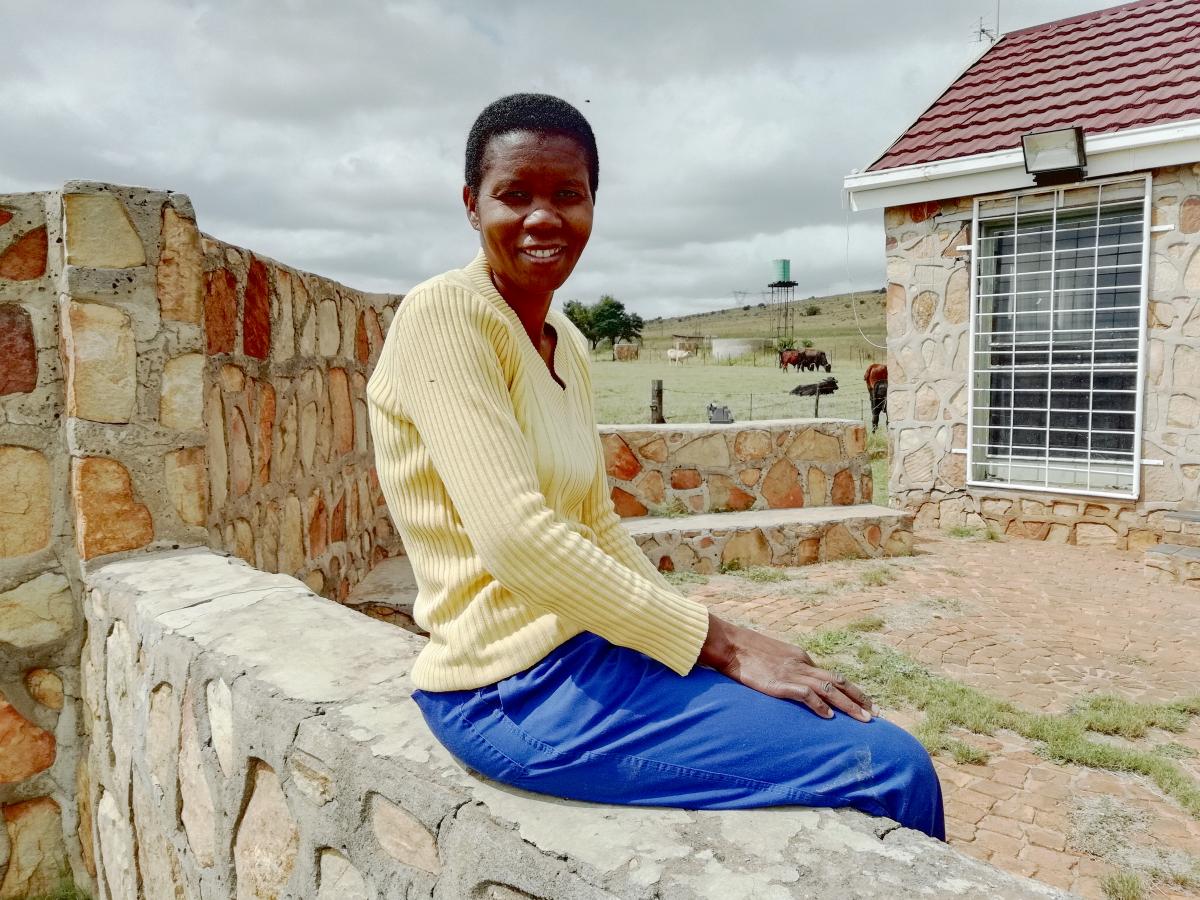 Betty Nyambi cannot believe that she is a successful pig farmer with 150 sows on her Bronkhorstspruit farm in Gauteng.
Betty Nyambi cannot believe that she is a successful pig farmer with 150 sows on her Bronkhorstspruit farm in Gauteng.
“I am so proud of myself because I am able to contribute to the economy and employ people on my farm. That I am a successful woman in a man’s world makes me even prouder.”
Nyambi, who has named her farming business Sincobile Trading and Agriculture Piggery, owns 173 hectares of land that she acquired through the Department of Rural Development and Land Reform to start her farming business.
She employs four people and is able to send about 100 pigs to the local abattoir each month.
“I have always had an interest in farming. After completing matric I decided to study agriculture at the Tshwane University of Technology. I proceeded to work on different farms to get practical experience. Anything that involves the soil and nature excites me.”
Nyambi started her business with only six pigs in 2015. The business took off when the Gauteng Department of Agriculture and Rural Development (GDARD) provided her with 26 pigs.
Currently, she has 150 sows and two boars. She also uses artificial insemination as part of her farming method.
“There is no reason why South Africans should not farm. Even if it’s a small garden in your backyard, your family will never go hungry. I enjoy my piggery and it has given me a chance to provide for my family and my community.”
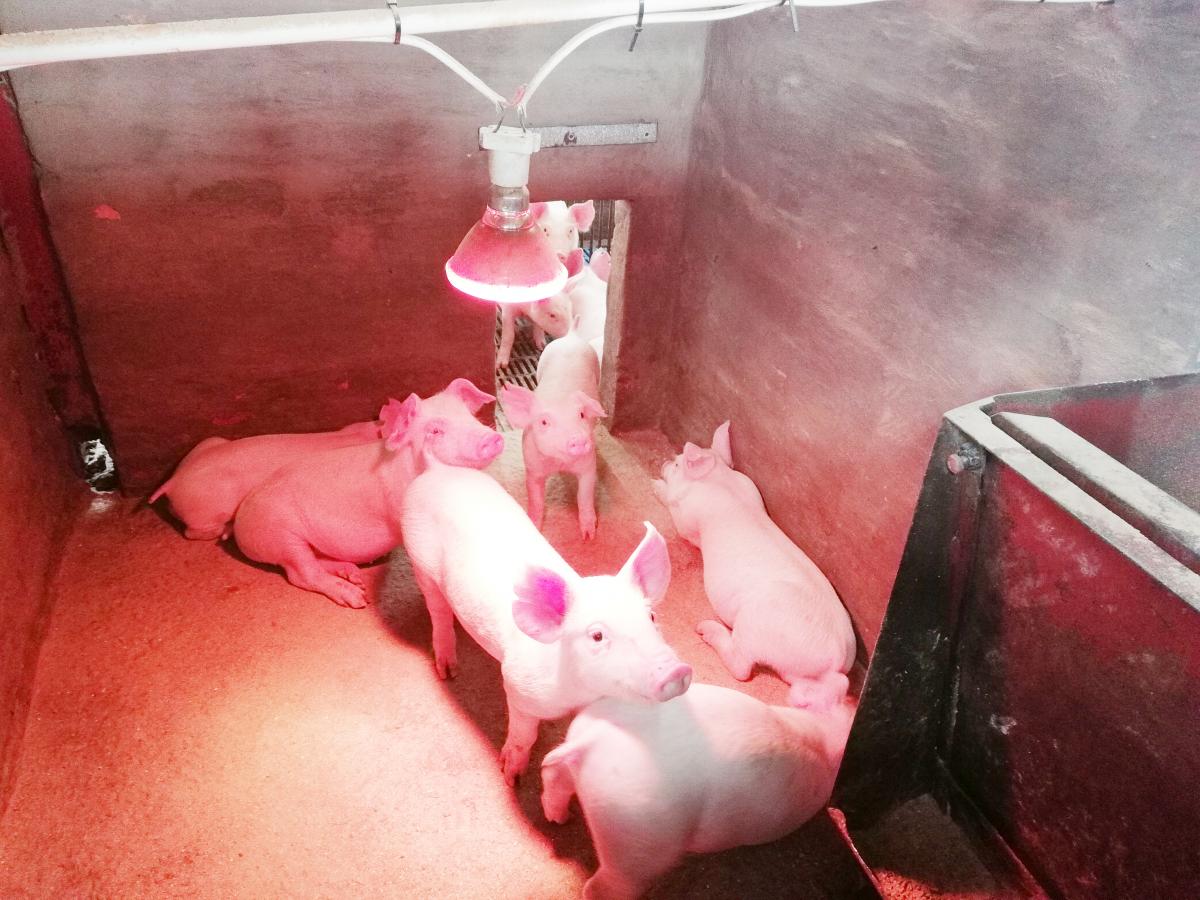 Nyambi adds that she received accolades for her hard work when she was the first runner-up in the Female Entrepreneur Farmer of the Year Awards in 2016. Despite her success she believes that her business has room to grow.
Nyambi adds that she received accolades for her hard work when she was the first runner-up in the Female Entrepreneur Farmer of the Year Awards in 2016. Despite her success she believes that her business has room to grow.
She has dispelled misconceptions that farming is for old people and encourages young women to enter the agriculture sector.
“I cannot stress enough the reasons why women and young people should follow the farming route. This field is easy especially once you get to understand it. I really encourage other South Africans to join me.”
Protection order violators can be arrested
Protection order violators can be arrested LondekileThe Commission for Gender Equality has urged South Africans to report cases of gender-based violence.
Commission Spokesperson Javu Baloyi said if women feel threatened in any way they should report to the police and apply for a protection order.
According to the South African Police Service a protection order will prevent the respondent from committing any specified act of domestic violence or sexual harassment; entering the joint residence or a specific part of the residence; entering the victim’s residence if they are not living together; entering the victim’s place of employment or office and having contact with a child or children if it is in the best interest of the child.
If a respondent contravenes any protection order, he or she can be arrested.
How to apply for a protection order
The complainant must make an affidavit and complete an application form at a police station.
- Supporting affidavits by persons who have knowledge of the matter in question may accompany the application.
- The documents must be handed to the clerk of the nearest court.
- The application for a protection order is not limited to the complainant. Any person who has an interest in the well-being of the complainant may also apply.
Cases of abuse can be reported at the nearest police station and gender discrimination can be reported to the Commission for Gender Equality at 0800 007 709.
SA joins world leaders in tackling ocean challenge
SA joins world leaders in tackling ocean challenge vuyelwanInternational Relations / Africa News
With an estimated eight million tonnes of plastic ending up in the world’s oceans each year, the sustainability of our seas is under threat.
President Cyril Ramaphosa is encouraged by the commitment of global leaders to turn the tide on the degradation of our oceans, following a working visit to Canada which he participated in the G7 Leaders’ Outreach Summit.
South Africa’s participation in the two-day session, which was held under the theme ‘Healthy, Productive and Resilient Oceans and Seas, Coasts and Communities’, was at the invitation of Canadian Prime Minister Justin Trudeau. 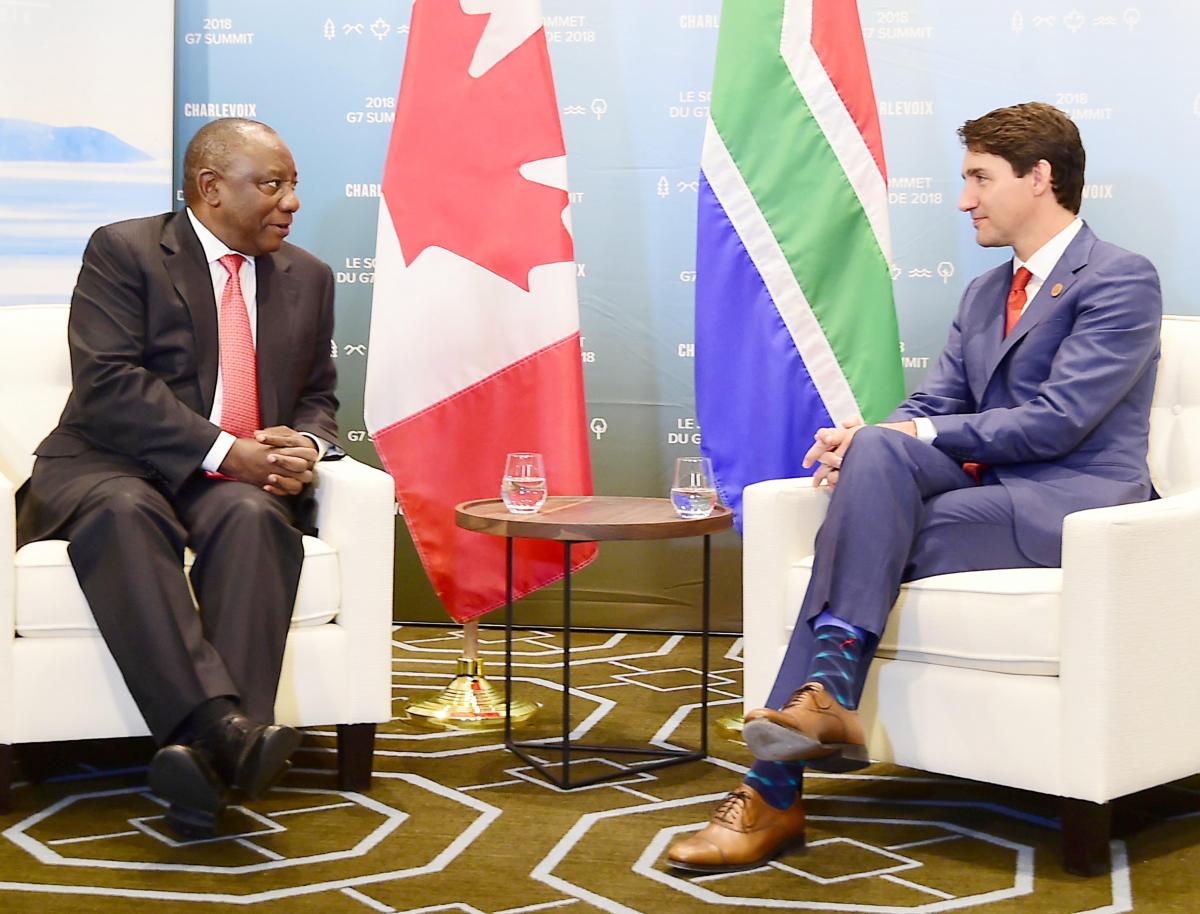
President Ramaphosa described the summit as a success and stressed the importance of the strong political signal delivered by the G7 leaders to address issues facing the world’s oceans, including stressors such as plastic pollution, building the resilience of coasts and communities, improving the protection of the world’s oceans and ensuring sustainable use of marine resources.
President Ramaphosa said it was of paramount importance to strengthen the multilateral approach to managing ocean resources beyond national jurisdiction.
He shared with other leaders South Africa’s strategy to research and develop alternatives and substitutes for single-use plastics.
These actions by South Africa are complemented by co-operative strategies to expand marine protected areas; address over-exploitation through illegal, unreported and unregulated fisheries detection and enforcement and supported by an integrated, shared ocean information system as a basis for the sustainable management of the oceans and its users.
The President believes the ocean economy has the potential to create around one million jobs.
While in Toronto, the President had the opportunity to engage directly with the business community. He welcomed the interest shown in South Africa as an investment destination.
Smart factory revitalises manufacturing in E Cape
Smart factory revitalises manufacturing in E Cape LondekileThe Eastern Cape is now home to a R1 billion electronics factory, thanks to the Department of Trade and Industry’s (dti) support of black industrialists.
he Minister of Trade and Industry, Dr Rob Davies, recently launched Yekani Manufacturing, a 100 percent black-owned smart factory, in the East London Industrial Development Zone (ELIDZ).
The world-class technologically advanced facility aims to push technology innovation limits and is estimated to create approximately 1 000 jobs.
Yekani is a beneficiary of the dti’s Black Industrialists Programme (BIP) and the Special Economic Zone Fund.
Minister Davies said South Africa has not been able to manufacture enough electronic products and has relied on imported tablets, cell phones and other electronic equipment.
“This company getting into this space is very important as we prepare ourselves for the Fourth Industrialist Revolution. This is an example of what we can do if we put our minds to it. This is an investment to celebrate, on a number of levels, in an industry that is strategically important and key to job creation,” the Minister said.
The dti provided R350 million for construction through the Special Economic Zone Fund and a R50 million grant from the BIP for machinery.
Yekani Group Chief Executive Office Dr Siphiwe Cele said the smart factory will enable Yekani to lead the way in technology innovation and help Africa secure its rightful place among global technology leaders.
“We believe that this new home will allow us to showcase our capability, flexibility, expertise, quality and contribution to the development of the manufacturing industry, not only in the country but also on the African continent,” said Cele.
Yekani manufactures Explora HD decoders, TEAC television sets, set-top-boxes and tablets.
The Black Industrialists Scheme was launched in 2016 and aims to unlock potential for emerging entrepreneurs. Government originally aimed to support 100 black industrialists by the end of the 2018/19 financial year. By the end of March 2018 the target had already been exceeded, with 102 approved for financial support and 48 companies receiving market access support.
Solving service delivery challenges in Eersterust
Solving service delivery challenges in Eersterust vuyelwanThe community of Eersterust in Pretoria has received timely assistance with service delivery from the City of Tshwane.
The city has reached out to residents after recent violent protests which rocked the area. This community programme forms part of the city’s commitment to fast track service delivery and promotes Batho Pele principles.
Residents were invited to visit the Eersterust Civic Centre to query and be briefed about issues pertaining to meter readings and invoicing, property rates, credit control and debt collection, municipal property rentals billing, and indigent and revenue protection. 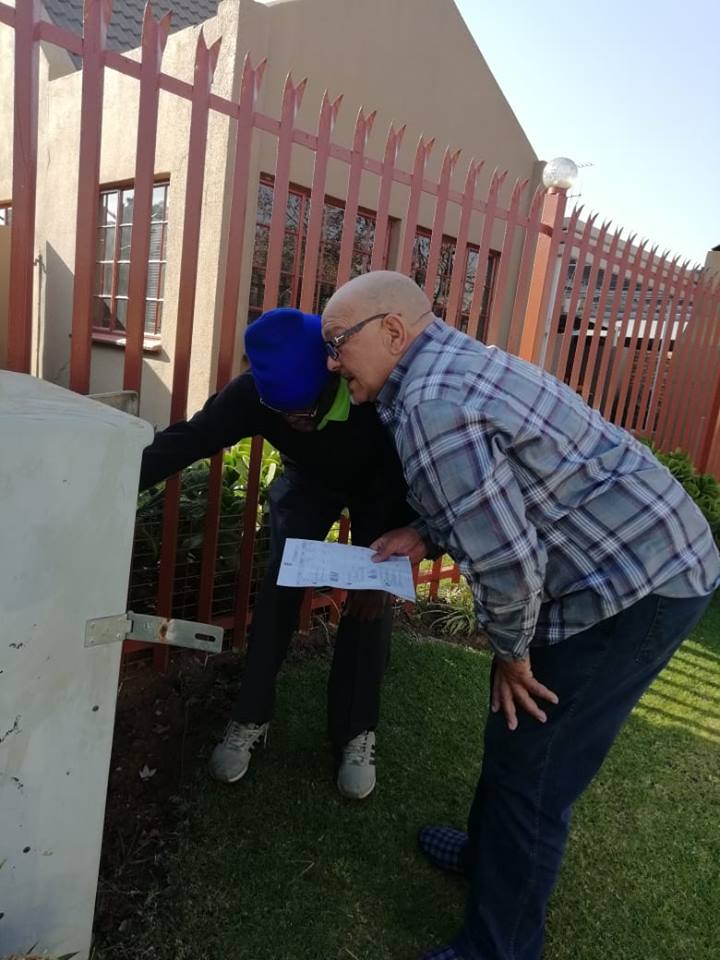
The city’s finance department led the programme with city officials also using the opportunity to visit and educate residents on reading water meters and managing their monthly electricity and water bills.
Ward councillor Benjamin Lawrence said the community was in great need of more outreach programmes.
“The outreach programme has focused on teaching residents to be aware of meter readings and under billing of accounts. City officials have also assisted residents in getting up to date with their accounts. There is still a backlog of work that needs to be dealt with, but this is a step in the right direction,” he said.
Lawrence said progress with service delivery in the area had been slow, but certain issues had been immediately resolved by the city which gave residents hope.
“We have had many challenges in this area for a long time. For 20 years there has been no maintenance of infrastructure in this area. The city has made improvements in small ways, for example, call centre assistance has improved, with turnaround times being much better than before. The community can see the process at work, and that something is being done.
“Residents are appreciative of the city’s efforts, which is why the outreach programme was so heavily attended. They have asked if there can be more of these programmes in future,” said Lawrence.
The City of Tshwane thanked the community for supporting the outreach programme, and hoped that it would create a better understanding among consumers and improve its relationship with residents, whom it considers its most valuable consumers.
This month in history
This month in history vuyelwanFormer President Nelson Mandela is born
The late President Nelson Rolihlahla Mandela was born into the Madiba clan in the small village of Mvezo in the district of Qunu near Umtata in the Eastern Cape on 18 July 1918.
Mandela became involved in politics while a student at Fort Hare University.
On 9 October 1963 Mandela and 10 other freedom fighters went on trial for sabotage and on 12 June 1964, Mandela was sentenced to life in prison on Robben Island. From Robben Island he was transferred to Pollsmoor Prison and then Victor Verster Prison before he was released on 11 February 1990.
Mandela engaged in talks with apartheid leaders, including former President FW de Klerk, to end the oppressive apartheid regime and in 1993, Mandela and De Klerk won the Nobel Peace Prize for their efforts to end apartheid as peacefully as possible.
Mandela was elected president of South Africa in 1994.
In 1999, at the end of his first term in office, he voluntarily stepped down. In 2009, the United Nations declared 18 July as International Nelson Mandela Day. (Sahistory.org)
This month in history
This month in history UrsulaInternational Relations / Africa News
3 July 1992 Fifa reinstates South Africa’s membership
Thirty-one years after being expelled, South Africa had its membership of the Football International Federation Association (Fifa) reinstated on 3 July 1992.
In 1956, the South African government introduced its first racist policy on sport. Prior to this, in keeping with pre-apartheid segregation, leagues had been divided according to race. Black-owned football clubs were officially not recognised as equal members with white-owned clubs.
South Africa was readmitted to the international soccer body for the second time in July 1992. The reinstatement of South Africa was motivated by the government of South Africa's release of all political prisoners and the open negotiation process of all political parties in South Africa. (Sahistory.org)
Training future gymnasts in rural Thaba Nchu
Training future gymnasts in rural Thaba Nchu lebangKediemetse Moloeloe wants to put Thaba Nchu in the Free State on the map through her passion for gymnastics as she teaches young children and youth about this sport.
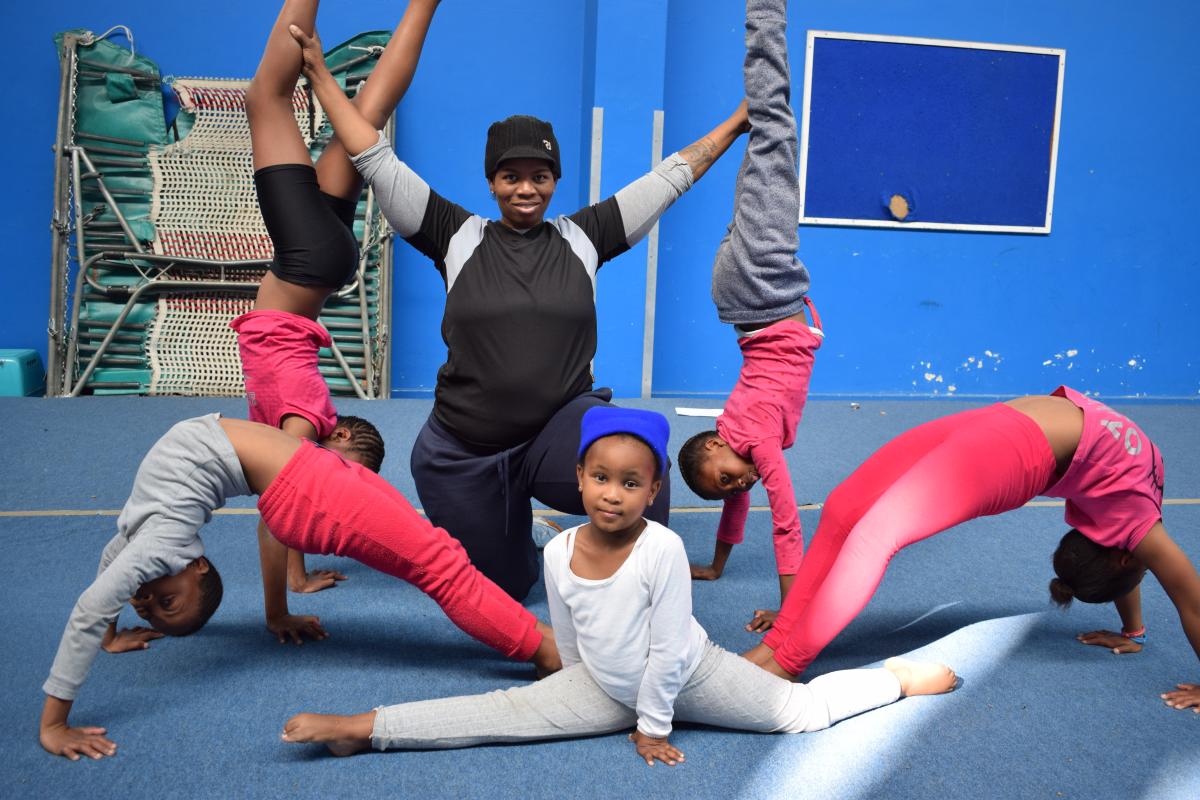 Moloeloe owns the Thaba Nchu Gymnastics Club at Mmabana Cultural Centre in Thaba Nchu which has 50 students.
Moloeloe owns the Thaba Nchu Gymnastics Club at Mmabana Cultural Centre in Thaba Nchu which has 50 students.
“At the moment I train children and youth with the youngest one being six years-old and the eldest seventeen.”
“Seeing these kids full of joy is my pride and pleasure keeps me doing what I do every day.”
Moloeloe (35) is a retired gymnast who has represented South Africa at the Gymnastrada in 1999 and again in 2007 during the World Gymnatrada in Austria.
She was introduced to gymnastics more than two decades ago and has never looked back.
“Gymnastics taught me a lot about discipline and rising up after failing. This is a very disciplined sport. When you fall down you have no choice but to get up.”
After retiring from competing she decided to pursue a career in statistics and economics especially since she had a qualification in this field but the love for gymnasium kept drawing her back.
She opted to approach the Department of Sports, Arts, Culture and Recreation in the Free State to pursue her dream of opening a centre where children and youth can become gymnasts.
Moloeloe added that she also wanted to see young people occupied in something positive especially with all the social ills in her community.
The road to having a gymnastic club was not easy for Moloeloe.
“The first year was extremely difficult having to pay rent for the club that only had one student. We worked hard in marketing our business for the community to know more about it.”
According to Moloeloe the club started gaining momentum two years after it was established and since then it has continued to be a success.
Highlighting some of the club’s achievements Moloeloe points out that one of her student’s acheived a silver medal during the National Gymnast Games last year.
“I want to put Thaba Nchu on the map and let people see that this rural place has talent and that is what has kept me home bound. If I can put one child on an Olympic stage I will be very proud,” said Moloeloe.
Visual learning for deaf children
Visual learning for deaf children lebangA public private partnership is bridging the digital divide and opening a whole new world of visual learning.
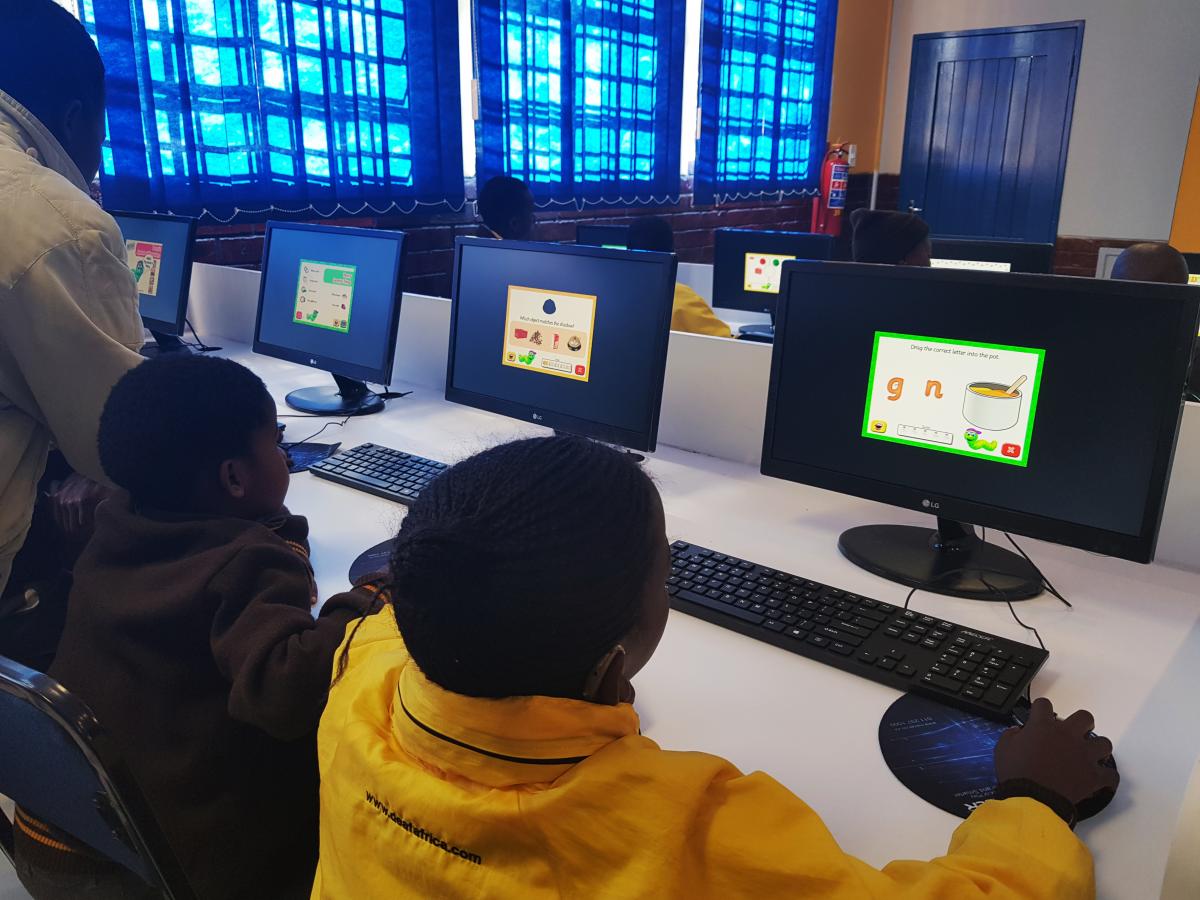 Learners at Sizwile School for the Deaf in Dobsonville, Soweto, are enjoying a more interactive and visual learning experience after a computer laboratory was handed over to the school by the Department of Social Development in partnership with the MTN SA Foundation.
Learners at Sizwile School for the Deaf in Dobsonville, Soweto, are enjoying a more interactive and visual learning experience after a computer laboratory was handed over to the school by the Department of Social Development in partnership with the MTN SA Foundation.
Principal Luhindi Madilonga said the donation of 22 computers to his school will help ensure that learners improve their overall performance. The computers have specialised software that caters for the needs of deaf learners. The package includes internet connection free for 12 months.
“Our learners rely on visuals to learn and not sound because they are deaf and using technology to teach them will only enhance teaching and learning in our school,” he said.
“Over and above providing lessons, the computer lab will be used for South African Sign Language examinations,” he said.
Different classes will take turns to make use of the computer laboratory. The school has Grade R to Grade 12 classes.
The school was established in 1978 and educates about 272 learners between the ages of three and 18 years. About 84 of these learners stay in a hostel on the school premises.
“We not only accommodate learners from Gauteng. Some of our learners come from Mpumalanga and Limpopo,” he said.
Sizwile School for the Deaf was identified as one of the 40 South African schools that will receive computer laboratories from the public private partnership between the Department of Social Development and the MTN SA Foundation in 2018.
The aim of the partnership is to address the issue of a lack of technologically advanced and user-friendly educational equipment in schools to assist learners with special needs.
When life throws you a lemon, farm it
When life throws you a lemon, farm it vuyelwanThe Western Cape Department of Agriculture runs a programme that helps new and established farmers with a support mechanism from day one – when they need help with funding– until they become self-sustainable.
The Farmer Support and Development Programme has helped young people like Wayne Mansfield (33) from Paarl, who has gone from working as a hawker for his uncle at the Cape Town Market during his school days to exporting his own lemons that he farms on a leased piece of land.
Ten years ago, when he was a 23-year-old entrepreneur, Mansfield turned down an opportunity to work at a farm he was sourcing lemons to resell. Adding that he was younger and had little interest in farming. 
However, a couple of years down the line, he changed his mind when he noticed an increased market demand for lemons.
“I also noticed that farmers were doing what we hawkers were doing – they were packing their own stock and selling it at the Cape Town market. I realised that soon there would not be a good market for us hawkers,” he said.
Around 2013, a local farmer agreed to mentor Mansfield and leased him 12 hectares of land. He also installed an irrigation system that enabled Mansfield to plough.
In 2015, he was able to export about 31 tonnes of lemons and in 2016, this figure rose substantially to 168 tonnes.
Thanks to the mentorship and help received from the Farmer Support and Development Programme which saw him receive a Comprehensive Agricultural Support Programme (CASP) grant in 2015, he was able to put down strong roots and flourish as a farmer.
Building capacity for farmers
The Farmer Support and Development Programme aims to build the capacity of historically disadvantaged communities and individuals, in particular Land Reform beneficiaries. It caters for emerging, subsistence, smallholder and commercial farmers.
Project administrator for agricultural development support services at the Western Cape Department of Agriculture Shaheed Martin said the programme has helped farmers become self-sustainable.
“We assist farmers’ right from the start. This means we help them with the applications process to access grant funding and once they are approved, we help them with implementation and production,” he said.
He explained that the department takes a holistic approach and provides the full complement of agricultural support services, including infrastructure support.
“We have economists and they in turn will give the farmer access to markets once they are established.” he said.
Young artisan leads in manufacturing
Young artisan leads in manufacturing UrsulaLow cost South African Bureau of Standards (SABS) approved sanitary towels have the potential to become a thriving manufacturing business for young people in the area.
O ne of the successful graduates of a Technical Vocational Education and Training institutions is making a big difference when it comes to women’s health in KwaZulu-Natal while showing that its “cool” to be a woman artisan.
ne of the successful graduates of a Technical Vocational Education and Training institutions is making a big difference when it comes to women’s health in KwaZulu-Natal while showing that its “cool” to be a woman artisan.
Twenty eight year-old Sinenhlanhla Majozi is a technician at a factory that manufactures low cost sanitary towels at the Coastal College Skills Training Centre for the community of Hammersdale near Durban.
Her job as an artisan is to maintain the machine which produces the sanitary towels, and she was well prepared for her position after obtaining an electrical engineering qualification from the TVET.
The college also houses the Coastal College Skills Training Centre so that many of the students who graduate are able to secure a job.
“The machine that we use is able to manufacture about 366 towels per minute. They are of good quality and they are very affordable. Women can get one pad for about R1,20,” she explained.
Students from the Coastal College Skills Training Centre and women from the Hammersdale community in KwaZulu-Natal took it upon themselves to manufacture the low cost sanitary towels to respond to the demand for affordable sanitary towels in the area.
“So far we supply Ukusa Secondary School with about 300 packets of sanitary towels per month. We are still working on marketing our product and distributing it to other parts of the province where it is needed by most women,” Majozi added.
She said she believes in the project because she is a woman and wanted know how the product that she uses is manufactured.
Majozi said about six other females from the community are currently being trained to operate the manufacturing machine as well.
“We heard about this opportunity and wanted to be part of the project to see how sanitary towels are manufactured from scratch,” she said.
At the moment there are three technicians and four operators who form part of the manufacturing team with other students who work as promoters of the pads.
The Department of Higher Education and Training had also been on a massive drive to encourage young people to be artisans.
It is being delivered through the Decade of the Artisan Programme which advocates that it is “cool” to be a woman artisan. The department reported that the numbers of females registered for artisanal trades were below 25 percent for the 2015/16 financial year and that this sort of project can help change perceptions.
Did you know?
Artisans can earn far more than professionals like bankers and accountants. For example, a plumber or electrician can earn R1000 an hour when they’ve gained some experience.
Youth provided a path out of generational poverty
Youth provided a path out of generational poverty lebangThe path out of Poverty Programme was established in 1998 to respond to the acute generational poverty of farm workers and their children in the Swartland area.
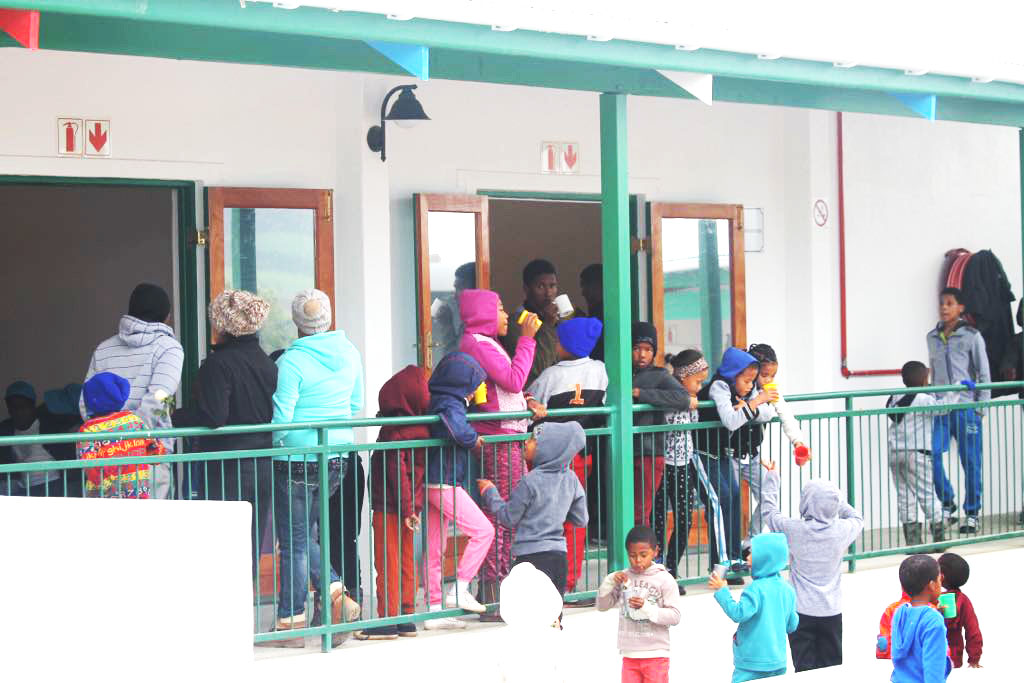 The youth of Porterville and surrounding areas in the Western Cape say their lives will change for the better now that they have a Path out of Poverty Youth Centre.
The youth of Porterville and surrounding areas in the Western Cape say their lives will change for the better now that they have a Path out of Poverty Youth Centre.
The youth centre was recently handed over to the community of Porterville by Mineral Resources Minister Gwede Mantashe.
Close to R5 million was invested in building the centre by PPC Limited through its Social and Labour Plan in partnership with the department and the Bergrivier Local Municipality.
Among other things, the centre provides children and youth from Porterville with opportunities to break the generational cycles of rural poverty by taking part in a range of activities. These include education support, school holiday programmes, youth life and leadership training, youth work preparedness training and a bicycle empowerment project.
Casey-Lee van der Merwe (17) who stays on a farm a few kilometres from Porterville said she was excited about the centre being close to her home because she will visit it on a weekly basis to attend computer classes.
“I do not have a personal computer or a laptop and since I am planning to go to university next year after completing my matric, I think the centre will prepare me to use a computer as my school does not offer computer lessons,” said Van der Merwe.
The Path out of Poverty Programme was established in 1998 to respond to the acute generational poverty of farm workers and their children in the Swartland area.
The custodian of the programme is the Goedgedacht Trust, which has committed to reaching 10 000 rural children and youth. The Porterville centre was the ninth centre to be built.
‘Kiu’ quenches thirst for theatre lovers
‘Kiu’ quenches thirst for theatre lovers UrsulaSport, Arts and Culture
In recent times, South Africa has been hard hit by severe drought and parts of the country are still trying to recover.
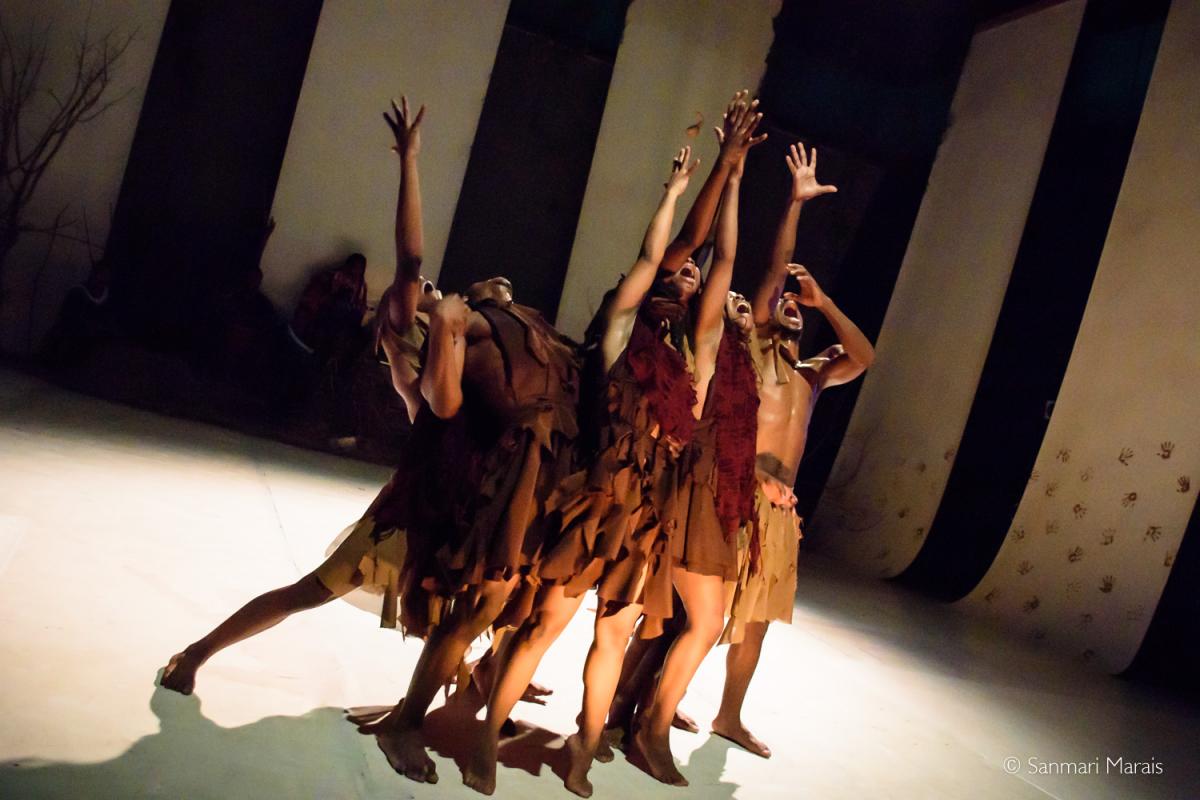
For theatre lovers, this reality is brought to them live on stage in the form of a dance production called ‘Kiu’, which is being showcased at the South African State Theatre until 24 July.
Kiu is a Swahili word that means ‘thirst’. The dance production is a diverse narrative signifying the critical age of drought in Africa and the significance of preserving water. Inspired by the ancient African rain dance, ‘Kiu’ is a plea for rainfall.
It is written, directed and choreographed by University of Pretoria and Tshwane University of Technology’s part-time drama lecturer Mduduzi Vincent Nhlapo.
“’Kiu’ is a profound and moving dance experience. Raw, sensitive, intense, hostile, sensuous, meditative and soul-searching, it is performed to hauntingly beautiful live Afrocentric music,” said Nhlapo.
The dance production premiered last year at the South African State Theatre and formed part of the main programme of the National Arts Festival in Makhanda in the Eastern Cape this year.
Those who are interested in watching the show can buy tickets for R110 at the State Theatre.
